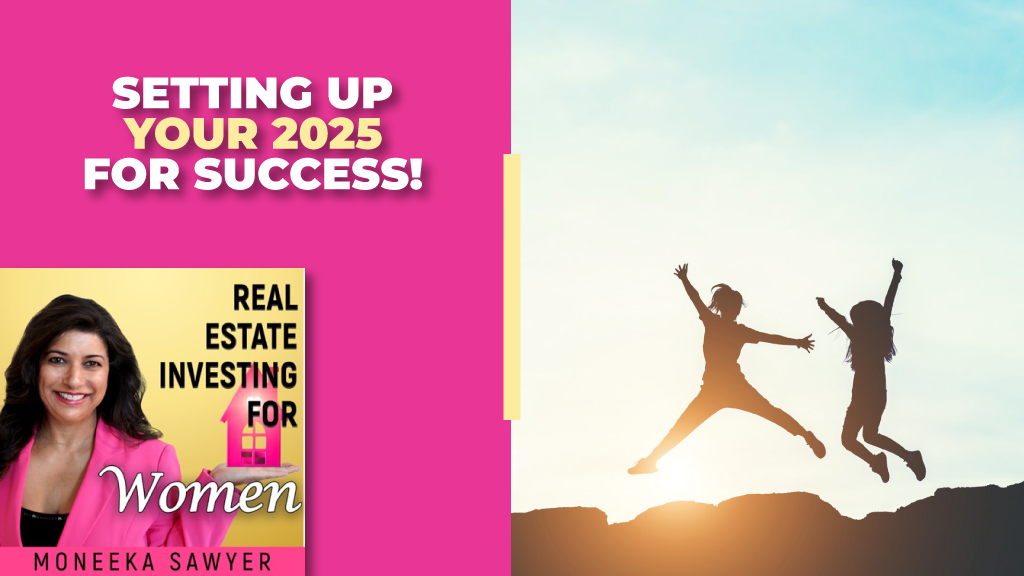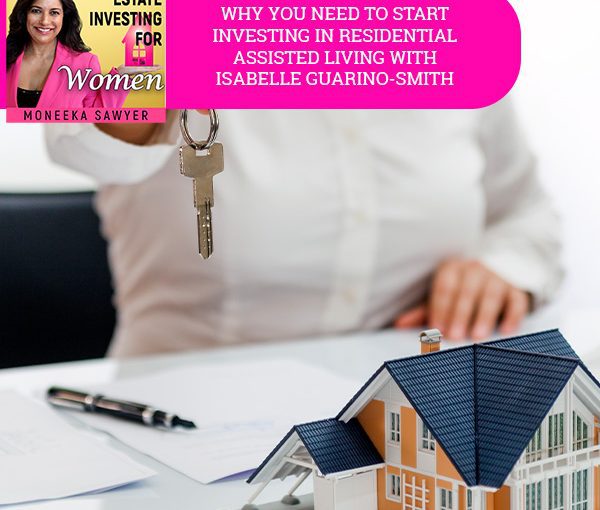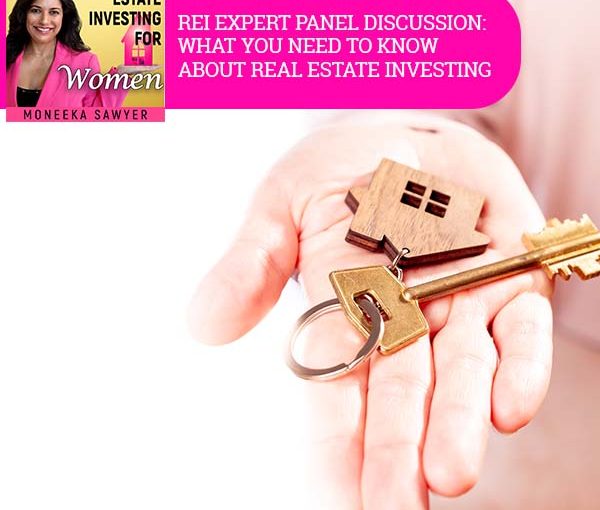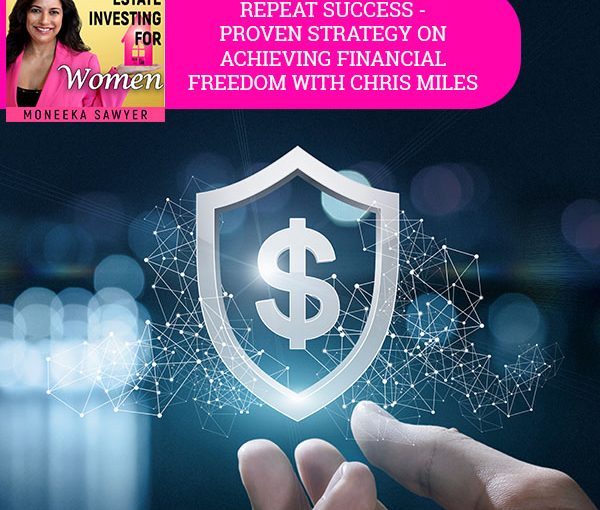Setting Up Your 2025 for Success!
Moneeka Sawyer is often described as one of the most blissful people you will ever meet. She has been investing in Real Estate for over 20 years, so has been through all the different cycles of the market. Still, she has turned $10,000 into over $5,000,000, working only 5-10 hours per MONTH with very little stress.
While building her multi-million dollar business, she has traveled to over 55 countries, dances every single day, supports causes that are important to her, and spends lots of time with her husband of over 20 years.
She is the international best-selling author of the multiple award-winning books “Choose Bliss: The Power and Practice of Joy and Contentment” and “Real Estate Investing for Women: Expert Conversations to Increase Wealth and Happiness the Blissful Way.”
Moneeka has been featured on stages including Carnegie Hall and Nasdaq, radio, podcasts such as Achieve Your Goals with Hal Elrod, and TV stations including ABC, CBS, FOX, and the CW, impacting over 150 million people.
Become the Bank for Passive Real Estate Income – Buy Notes
Moneeka Sawyer is often described as one of the most blissful people you will ever meet. She has been investing in Real Estate for over 20 years, so has been through all the different cycles of the market. Still, she has turned $10,000 into over $5,000,000, working only 5-10 hours per MONTH with very little stress.
While building her multi-million dollar business, she has traveled to over 55 countries, dances every single day, supports causes that are important to her, and spends lots of time with her husband of over 20 years.
She is the international best-selling author of the multiple award-winning books “Choose Bliss: The Power and Practice of Joy and Contentment” and “Real Estate Investing for Women: Expert Conversations to Increase Wealth and Happiness the Blissful Way.”
Moneeka has been featured on stages including Carnegie Hall and Nasdaq, radio, podcasts such as Achieve Your Goals with Hal Elrod, and TV stations including ABC, CBS, FOX, and the CW, impacting over 150 million people.
Why You Need To Start Investing In Residential Assisted Living With Isabelle Guarino-Smith
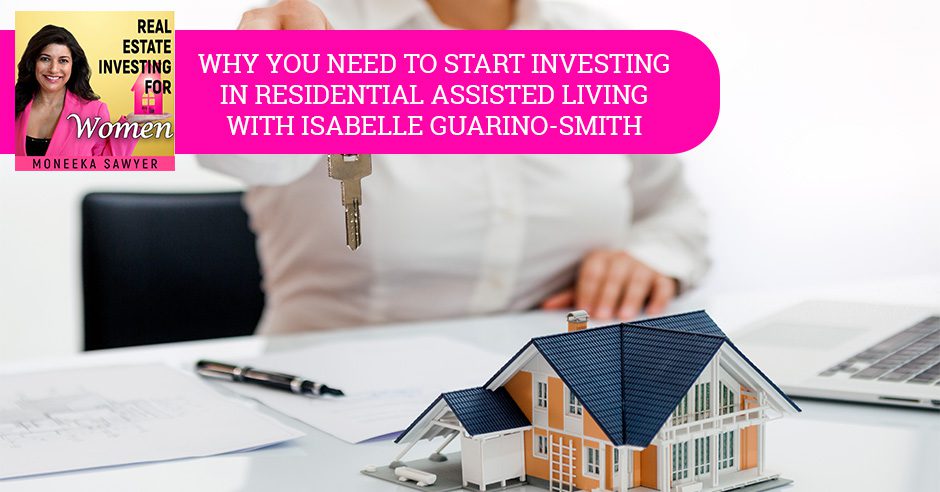
Have you looked into residential assisted living options for your loved ones? Did you know that rather than spending thousands, you could be the one earning and producing cashflow, all while having your senior relatives receive the best care? That’s what investing in residential assisted living is! Isabelle Guarino-Smith, COO of Residential Assisted Living Academy, is here to elaborate on this win-win-win approach to caring for your aging loved ones. She joins Moneeka Sawyer to share how she first started looking into assisted living after the need came up in her life. After learning more about the industry, she turned what could’ve been a financial crisis for the family into a massive opportunity. Tune in to this episode filled with incredible insight and information on how you can earn while helping seniors receive the best care possible.
—
Watch the episode here
Listen to the podcast here
Why You Need To Start Investing In Residential Assisted Living With Isabelle Guarino-Smith
Real Estate Investing For Women
I am so excited to welcome to the show, Isabelle Guarino-Smith. She is a graduate of Arizona State University, a former flight attendant, a Walt Disney World intern, and now Residential Assisted Living Academy’s leading lady. She has been working as the COO of the company for several years, keeping everyone in line and on task. She’s been featured in many magazines and articles on the topic of senior housing and was given the title of one of the top influencers in senior housing. She also won Aging Media’s Future Leaders of Assisted Living Award in 2020. That’s pretty impressive, Isabelle, welcome to the show.
Thank you so much for having me. I’m excited to be here.
You had a varied career from flight attendant to Walt Disney World intern. I love that. How did you end up in assisted living?
It’s interesting. For us, it started with family. My grandmother fell, she broke her hip, and the doctor was like, “She can’t go home alone. She needs 24/7 care.” Many of your readers might have been in that same situation themselves with aging loved ones. This happens to almost everybody. This happened to us and it was like, “What do you do? Do you pay for in-home care?” That is incredibly expensive. “Do you quit your job and take care of your loved one full-time?” That’s your full-time thing. I’m not born to be a caregiver, so that didn’t make a lot of sense or you put them into a home.
As soon as you say it, you feel icky. “I can’t do this. This is my beloved grandmother, mom, dad,” or whatever the case may be. For us, it was like, “Let’s find an alternative option. Let’s find something that we are comfortable with.” When we realized it was going to cost $5,000 a month to have her stay in one of these homes, or we did quick math and we are like, “We could make $10,000 a month if we owned the real estate in the business and she could live for free.” It made a whole lot of sense to say, “Let’s get involved on the real estate side, give her the best of the best care, and we get two birds with one stone.” It started with something close to home for me and my family.
We have had to make this decision for my father-in-law. We did end up putting him in a home because he can’t move at all and he’s so big. We can’t lift him. We can’t clean him. It was impossible and there was nobody at home. We are not natural caretakers in the way that they are in these other places, lifting, cleaning, diapers, and all of that stuff. What’s fascinating is that they were originally going to charge us $5,300, but now that he’s in it, it’s costing close to $10,000 because there’s all the added care.
The $5,300 was base care. We had to up-level, ratchet it up because he can’t even get out of bed. We kept ratcheting it up. Now, we moved him to memory care, but then there were other things that are not covered. Sometimes Medicare covers some of this. In our case, it didn’t cover anything, but the other interesting thing was diapers. We are paying $1,000 a month on diapers or a physical trainer to come in so he could continue to move his hands.
He lost the use of his hands so we can no longer feed himself. Now he’s in memory care, but we were trying to have his hands continue to be used, and so we had someone coming in to train him with his hands. That was costing $1,000 a month. It’s amazing once we go down this path what it costs. What an interesting strategy you came up with to deal with that cost. That’s fascinating.
I tell that to people all the time. I say, “What’s the difference between a big box facility and a residential assisted living home?” I say, “One of the things is the cost of care.” When you move in, they tell you it’s going to be a certain dollar amount but you didn’t take the bath on Tuesday. You took it on Saturday and they are like an extra $500 or you tried to run away, an extra $1,000.
They knock things up. You get that first bill and it’s $8,000 and you are like, “What happened, dad? I signed up for $5,300.” I tell people this and they are like, “There’s no way.” I’m like, “Wait until it happens to you. You are going to look for an alternative to say, ‘How can I get this where it’s one flat rate?’ No matter what happens to them, they are getting the best of the best care. Low caregiver to resident ratio, and then if you can own it and be cash flowing and holding that real estate, it’s a win-win.” I say that story all the time. Now I’m going to have to shout you out and say, “For real, it’s happening.”
There were all these little things. They give them a little emergency button that they wear around their neck. As he can’t reach over and pull the cord, so he’s got this little thing around his neck where he kept pushing the cord. He’d like, “I need my cell phone plugged in.” He kept pushing the cord. They started charging us for every single push on that cord. They are like, “We are not supposed to get that push 200 times, but we can’t control him.”
He needs someone there.
That’s right. It was so fascinating. I’m like, “Thank goodness.” I talk all about how money is good. I keep taking such good care of my father-in-law and I’ve been like, “We are not going to yell at him. We are not going to yell at these people that are taking care of him. We are going to try to figure it out.” They were providing diapers for $1,500. We are now ordering them on Amazon with a subscription for $1,000.
We are finding ways to cut back our costs, but we are not so freaked out. It’s not like our budget is going to die because we are doing this thing. It’s interesting what good things money can do for us. That’s all I’m saying. We can take care of the people we love. I’m so excited Isabelle to talk to you because I’m in it.
I was having a conversation with my dad. He’s fallen three times. I’m trying to convince him to use a walker, which he will not do, but then I’m like, “Use a cane.” My dad says to me, “I have lived my life. If I die now, it’s okay.” I’m like, “I’m not worried about you dying even if I don’t want you to die. If you fall down and your quality of life disappears, what is that going to be like for you? Could you please start using a cane or something so you stop falling?” We talk about this for an hour. He says, “I will think about it.”
He takes a fall. What if he breaks something? They don’t heal. Now suddenly, they don’t get to be with their family because they are either stuck in a room. If we could afford care at home, we have got this $10,000 expense for another parent or they are in a home. It’s a difficult thing like what you described. I had this conversation with my dad, “Dad, you need to manage your quality of life. That’s the thing. If you are alive, we would rather you be happy.”
It’s real life. The thing is right now, your dad is in the Silent Generation, not Baby Boomers. In the Silent Generation, there are only 47 million of them. Baby Boomers are 76 million. We are about to double the need for care and we don’t have the systems to be prepared for the silver tsunami. Baby Boomers don’t need assisted living for another 20 to 30 years. It’s their parents who are in it. If we are already 1.3 million beds short, and there are only 43 million and we are expecting 76 million over the next several years, what’s going to happen?
No one is pumping these beds out that fast. It’s a massive crisis or mega opportunity, and it’s something that everyone is going to deal with. It’s either going to be your loved one or your own self lying in the bed, writing a check to somebody else, or you can play the ownership role and take care of your own loved ones and yourself and maybe even leave a blessing or leave a legacy to your own kids. It could be good.
Tell us what is assisted living as you are defining it because you said something about assisted living versus big box. Let’s talk a little bit about that and how you are defining it.
What we teach and train on what we do ourselves is residential assisted living. It’s senior housing but in a residential home, in a single-family neighborhood where there are only 6 to 16 seniors living in that one home usually in private bedrooms and private bathrooms. They have shared common spaces like a living room, dining room, and front room, maybe even a library or hair salon. These are more upscale homes in nice parts of town.
In the home, there’s 24/7 care help with activities of daily living, getting up, walking, bathing, taking medications, eating, or whatever they need. In some of these homes, there’s a private chef but there are always 24/7 caregivers and a licensed administrator who’s running the business. The role we play in that we teach other people to play is that owner’s box.
Owning the real estate and business, not working and living in the home, but owning and operating the business in that sense. It’s different from a big box because it’s not a big commercial facility with hundreds of beds. The resident-to-caregiver ratio is different. The big box facility oftentimes is 15 to 1. If they are telling you it’s lower, ask them if it’s staff or caregivers, because oftentimes they will include staff which means chefs, janitors, front desk, people, and landscapers.
A landscaper is not caring for your dad. They should not be included in the staff-to-resident ratio. It’s the caregiver-to-resident ratio and you can get fifteen people. I can’t take care of fifteen people at one time. I don’t think you can. That’s impossible, so we are setting up those caregivers for failure which is why they are saying, “We are going to charge you more when your dad dings this all the time,” because they don’t have the time and capacity to come to visit him that often.
That’s sad. That’s not okay. We need to give our seniors better quality of care and life. In our homes, it’s usually a 4 to 1 or 5 to 1 ratio. It’s also a much smaller environment, so you can have eyes on the residents at all times. That’s what we teach people to do. It’s still senior housing. It’s an alternative and a real estate investment opportunity for those who are in that world.
We need to give our seniors better quality of care, better quality of life. Share on XHow is this different than a nursing home? We have got the assisted living and the big box and then there’s also the nursing facilities.
A nursing home is typically where doctors, nurses, gurneys, and IVs are. It’s medical. In assisted living, you can be licensed to care for memory care. You can be licensed for respite and hospice, but you can’t be licensed in a physical home to do nursing care. That’s where they do have to transition on to that. Most people will stay in our homes until they pass on to the next life or they will move on to nursing care because their needs are too great for what we are licensed to care for.
It’s more medical. When would someone need that?
It’s when you have had assisted living for enough time and then maybe something happens right where you need to be hooked up to IVs and you need a 24/7 doctor watch on you. It could be health declining. It could be that you had a bad fall. Most people don’t leave our homes. They pass on from our homes. It’s a very small percentage who move to need that level of care, but it ranges. It’s person-to-person based on your health and your needs.
Talk to us a little bit about the business of this. How much money can be made? How is it set up? Tell me a little bit more about that. didn’t even see it as an option when I was doing research on these homes. What I saw were the places that had 55 to 100 rooms. We chose a place with 55. There are active living communities, where there are single-family homes and they are all around them.
There’s this big community area and so they have their party areas, their pool, maybe a golf course close by, maybe an on-campus store or something like that, but they are all living in their own single-family home. Those were the two that I was seeing. Tell me a little bit more about what you are talking about and how the money looks around that.
Where do you live?
At the time, I was living in Campbell, California.
That’s good to know because 61% of assisted living beds are in residential assisted living homes. We are the majority, but no one knows about us because there’s no big sign out front. You could drive by one of these homes and never know it was a care home. You never know that in California, you are allowed to have six residents in a home. Those homes could be a 4-bedroom, 3-bath. That could be a 5-bedroom, 4-bath. It’s not this massive, crazy, huge home. You could have driven right by and never known that it existed. Those solo owners don’t have the marketing dollars that Brookdale, Sunrise, and Atrium have. It’s different.
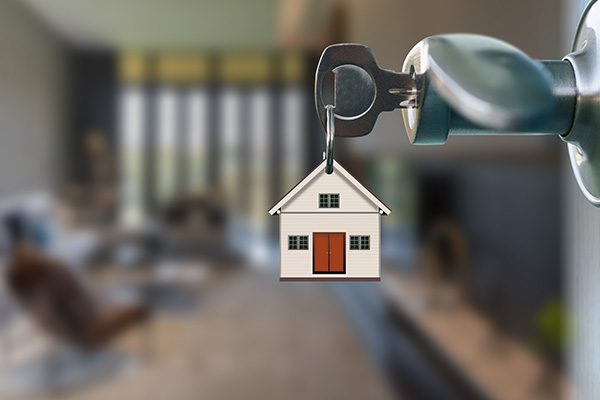
Residential Assisted Living: 61% of assisted living beds are in residential assisted living homes. We are actually the majority, but no one knows about us because there’s no big sign out front.
How do people even find it then?
We created a map called the RAL Home Locator and that’s the website, too, RALHomeLocator.com. There you can see all 30,000 of these homes that exist across the country right now. You would be what we consider a Daughter Judy, the person who’s in charge of their loved one’s care. They are the ones searching for the care, maybe paying for the care, checking in on the care, complaining about the care, praising the care, or whatever it might be.
Daughter Judy will start researching exactly like you did, trying to find homes in the area to see where we should put them. What options are available? There’s an entire industry of people called placement agents who will usually work with families like you to say, “What’s your budget and options?” and then they will pass out business cards. They get paid if you choose one of the homes they send you to. They will try to find a good option for you, but also, they are getting paid for it. It’s not free labor. They might be recommending smaller and bigger homes depending on the needs of your loved one.
There are organizations that will place your loved ones that can help you with that. That’s awesome because I couldn’t even find that when I was looking. I wonder, “Am I lame? Why couldn’t I find this stuff? Do you Google for this?”
Lots on Google. Lots online. This is starting to become a concern for everyone. We are like a baby industry. It’s growing in popularity. Back in the day, it used to be they would come live with you and now people are working two careers in one household and that doesn’t work a lot of times because you’ve got your own kids. It’s the Sandwich Generation.
You’re taking care of your kids. Now you’ve got to take care of them. It’s a lot and it’s not that you don’t want to. It’s not the same as it used to be. We are starting to see a lot more popularity in that. A lot more national and local placement agents are popping up a lot, more online marketing, and things of that nature. It’s going to be red corvette syndrome. Once you’ve been exposed, you start seeing it everywhere.
Tell us a little bit about how the money works with this stuff.
We were saying that the national average to live in one of these homes is $4,500 a month. That’s going to totally range depending on what city,-state, or county you are in. If you are in California, the California state average is $5,250 or something like that, but depending on your county or city, it could be different. Salinas is almost $7,100 on average and Stockton is $3,500. It ranges.
If we did national numbers and we said $4,500 a month per person, in every city or county, you are also allowed to have a different amount of maximum amount of residents. Six to sixteen are the rules in most cities or states, California is six. I’m in Arizona. Ours is ten. If you are in Texas, it’s sixteen. If you are in Florida, it’s twelve. If you are in Jersey, it’s fifteen. It ranges everywhere.
Let’s say we did ten since it’s right in the middle of 6 and 16. $4,500 a month times 10 residents in the home. That’s $45,000 coming in every single month, but you have your expenses, the food, the cable activities, and paying for your staff, all-in expenses, including liability insurance, maintenance, and everything.
Maybe on that home, it might be $30,000 a month, then your debt service. Are you going to lease this home or own this home? Your debt service, your mortgage, and your payment on the property. Let’s say it’s another $5,000. You can get a pretty nice home for $5,000 a month in most parts of the country. That means this one home is netting you as the owner $10,000 a month. That’s just an average home. There are a lot of markets where the average number is a lot higher than that so you are getting more per resident. That’s a quick, easy, or fast example of how to get to that $10,000 a month on one of these homes.
You are saying that you have one caretaker per 4 or 5 residents. When you were talking about all the costs of the staff, that includes everybody. That includes the chef, the activities director, and the gardener.
It includes all of it, but also think it’s a single-family home. You need one landscaper coming once a week, every other week. It’s not a crazy expense. In my own personal home, our landscaper comes every week and I pay them $100. It’s a line item. The chef is the same thing. In some of these homes, the caregivers do the cooking and that’s what they do and what they are responsible for caring for the residents and doing the cooking and cleaning.
In other more high-end homes, we talk about the different levels of homes based on where the home is, what amenities you have within the home, and things of that nature. A level 3 or level 4 home would not have a private chef. The caregivers would more than likely be doing the cooking, but a level five home probably would have a chef.
My nicest home, we have got a chef there who does made-to-order breakfast and fresh lunch for them and then cooks the dinner. He’s out the door by noon. The caregivers at night warm up whatever he prepared for dinner so that it’s ready to go, but they don’t have a chef there. There are different amenities for different homes. Because of those amenities, the residents are going to be charged different amounts.
The level of care also plays a heavy role in how much the resident is paying. When we say the average in the home is $4,500 a month, you might have someone like your dad who’s paying $9,000 or $10,000 in the home, and you might have someone who’s paying $3,000 in the home and other people in the 4 to 5 range, and so an average is out to about $4,500 a month.
You don’t necessarily want to fill your home with a bunch of high-need clients because that’s going to overwork your staff. A business doesn’t work unless you pay attention to the three legs of the stool, the residents, the staff, and the business. You can’t focus on the business and making money. No. You’ve got to care for the other people involved in this and make sure that all those components are there making sense and working well.
A business doesn't work unless you pay attention to the three legs of the stool: the residents, the staff and the business. Share on XThat’s a lot to think about.
It’s a whole business. If you have one, they could live for free, you could live for free, and you cashflow.
You own the real estate but someone else manages the whole thing and you pay that person.
That’s your licensed administrator. In the real estate world, you could call them your property manager but they are much more than that. They are licensed through the state as medical professionals who are able to care for the residents, but they also might do many other things. Hire and fire your staff. Tour and market your home. They might be in charge of all the other contractors like we were talking about, the chef and landscaper as someone to come over and do activities. They could have whole varied roles and responsibilities for them.
I like to find an administrator. My one administrator oversees all three of my homes. I have one phone call with her a week and I visit the homes every other month. The way we have set it up is passive. In the beginning, it wasn’t that way but we had to start to formulate that and make it become that way. That’s what I like to share with other real estate investors how to do. Most people don’t want to be hands-on in the home doing anything and it’s like, “Not what we do. Not what I want to show you how to do. I want to show you how to do this more passively.”
In the old days, we had real BnBs, not Airbnbs. We had real Bed and Breakfast. There were all these rules and regulations about you having to have a certain kitchen. You had to have a certain number of bathrooms. There were all these rules. I’m assuming that you can’t get a big house and turn it into a senior living without following all regulations. There’s got to be other stuff. Talk to us a little bit about that.
There are rules and regulations and I love that because you don’t want anybody getting into this industry. We want quality people who are willing to jump through hoops, have the right heart, have the right passion and are going to care for our seniors. These are people’s lives. I’m totally okay with rules and regs. In every state, these homes need to be licensed. The physical home has a license. It’s mostly based on senior safety.

Residential Assisted Living: There are rules and regulations because you don’t want just anybody getting into this industry. We want quality people who are willing to jump through hoops, who have the right heart, the right passion and are going to care for our seniors.
The home does not have to be ADA-compliant, but it needs to be as close to that as possible. Meaning wider hallways and doorways ramps, and guardrails, maybe fire suppression or sprinklers, different things of that nature to make it safe for the seniors. If you have to be Tom Cruise to get out of the house, it’s not senior safe. We want to make sure they are safe. That’s a priority.
The physical home will have a license. The state requirements are a pretty bare minimum. Most states say 80 to 100 square feet per person. That is tiny. That’s not okay. Our rule of thumb is 300 to 500 square feet per person. If you are going to have ten people in the home minimum of 3,000 square foot home, upwards of 5,000 is much more comfortable.
Most of these seniors are going to want a private bedroom and a private bathroom. You are going to have a hard time finding a 10-bedroom, 10-bath home on the market, but you can buy a 5 or 6-bedroom home and convert it to become. There are four ways you could get into the industry, and one of them is buying a single-family home and converting it to become. All of our homes are 10-bedroom, 10-bath, but they didn’t start that way. They started 5 or 6 bedrooms and we converted them and now they have those ten bedrooms.
Using the space a little bit differently, but whatever the state says, we go above that. Make this nice and comfortable because the seniors deserve it. If they are going to be paying a pretty penny, they are going to be comparing you to the other homes where they are getting a private bedroom and private bath. You need to be able to supply that.
When you were talking about this, let’s say we buy a 5-bedroom, 4-bath single-family home. They are quite a lot of them here, but they all have lots of stairs. I was thinking of one that’s on the market close to my house here in Sacramento. It used to be San Jose. All of the houses are like these old, beautiful Victorians or craftsman.
I live in a craftsman which is fun, but there are so many stairs and the hallways are narrow. People were much smaller in those days. Talk to me about what does that look like? How do you find these places? What do you do if you are in a situation where the only houses that are coming on the market are heavy in the stairs, narrow hallways, and that type of thing?
You can add chairlifts and elevators. You are going to need something because the seniors typically cannot climb the stairs at that point. The thin hallways are tough because unless you are going to knock down the house and redo it, there’s sometimes not much you can do when you have a historic home like that, and you don’t want to take away the beauty of the way it was built. There’s some history in that and you don’t want to remove that.
Honestly, I would say that probably in those types of homes might not be the right fit because you would prefer ranch style. You would prefer a single level. We have a guy in Jersey who’s got a four-story home. On the East Coast, everyone’s got a basement. He is got a nice big built-out basement, two stories, and a full third story up there that’s stunning. He added in a residential elevator. It’s $30,000 but it’s a one-time fee that you pay. If you are going to be making that back, that home, he cashflows $40,000 a month because all his people are paying over $8,000 and he has 15 people in that home. All private bedrooms and private bathrooms, it’s stunning.
I would say it might not be the right fit because of the style of homes there unless you can add in a chairlift or an elevator and those stairs. I don’t know how well they do with the chairlift and the homes because they are so tight that sometimes an elevator might not work either unless it was the perfect property. Going a little bit outside of town where you have ranches, where you have more land, and where you have that capability, Daughter Judy only wants to drive a certain distance from where she lives.
Find out the demographic research on 50 to 70-year-olds who are in the upper middle class and own their home, where do they live, eat, work, sleep, and play. We want to put the residential assisted living home right near them because they don’t want to drive 45 minutes to go see mom or dad. They want to go right on their way home from work. Doing that demographic research is a great place to start, and then finding those properties that already lend themselves to this.
Doing that demographic research is a great place to start. Share on XHow far does Daughter Judy drive usually?
They say that usually, they want to be within a 5 to 10-minute radius of them. The 5 to 10-minute radius in Oklahoma is completely different than in LA. Depending on where they live, that could look very different but most Daughter Judys want to be close. Can I ask how far are you from your dad?
This is an interesting story. This is my father-in-law. We have lived down in the Bay Area for many years so we have been close to him. My parents were two and a half hours away in Sacramento. When we moved him into his home, he was 25 minutes away and it was a bear because we were so busy. I work at home, but still at the end of the day, driving down there, you are hitting all the traffic.
For twenty-five minutes, we thought, “This is nothing. It’s fine.” We did a bunch of research. We found three places that we liked and we let my father-in-law pick. He gets to have some say in this. We visited the different places and he picked this place and we were like, “He likes this place. Twenty-five minutes.” It was so hard for us to get down there more than once a week, and it felt terrible.
Now, we have moved to Sacramento to be close to my parents. Now I’m 15 minutes away from my parents, and 2.5 hours away from him. We are looking at moving him up to Sacramento with us, but he’s in hospice. That’s another whole long story. Now I live fifteen minutes away from my dad. When he was at his home, it was 25 minutes and you are right. We couldn’t figure it out, trying to get all of us there together. If I could go one day, my husband could go a different day, but getting the two of us there together with the traffic and all of that stuff was hard.
It’s a lot harder than people think. When we talk about a location for residential assisted living, I always tell people, “The first key is finding out the demographics of the area because they are the decision-makers more than likely. They want mom or dad near them.” It’s like, “I don’t care if you have the perfect house, if it is not near the right demographic, it won’t work.”
What they are looking for is always price, proximity, service amenities, and then the feel when they walk in. How do they feel in their heart, mind, and soul? Is my parent or my loved one going to be safe here? Are they going to be comfortable here? There’s a real feel to a lot of these and sometimes you walk in and you are like, “No.”

Residential Assisted Living: What they’re looking for is always price, proximity and service amenities, and the feel when they walk in.
I did that. I was like, “No. This is not going to work.”
Sometimes you walk in and you are like, “I can live here. This is pretty nice. I could do this.” You want to have that wow factor and that feeling when they walk in. You want to make them feel comfortable, and that is one of the perks and benefits of residential assisted living. It’s a home. It’s not home-like. It’s a literal home. We grew up in homes. Who doesn’t want to stay in a home? This is pretty much the only option besides in-home care which is super expensive.
Tell us a little bit about how we can take advantage of this and how we can learn more.
We teach and train people how to do this because I do it myself, and then we teach people how to do this. We have three-day training events there in Phoenix, Arizona, but we also have online courses. If anybody wants to get started for free, check it out. We have got webinars and free books at RAL101.com where you can learn the four different ways you could get started in this.
You could learn the three smartest options for you to participate in. Maybe it’s as a lender. Maybe it’s owning the real estate or the real estate and the business. We go through all those options and then the five keys to success. You can learn and know all more about that on RAL 101. We are going to stick around for your special readers and dive deep. I’m excited to be able to share with them a little bit more too.
What would you like to share in EXTRA? We didn’t decide beforehand because she was like, “You are going to have questions,” but I have got so many questions. It’s hard to narrow them down. I like the four different ways to get started doing a deep dive on that. You’ve mentioned something. What did you say?
We said 4 smartest ways and 3 options to participate depending on what role they want to take, and then the 5 keys to success. I could do either on anyone.
I wish I could get your input on this. Let’s get the ways to get started. I hope I picked the right one. In EXTRA, we are going to talk about the ways to get started in this industry. It’s in her URL. You can go there for all of their trainings and all of that information also. In EXTRA, we will be talking about how to get started in this business. That was so amazing. Such great information. Is there anything else you want to add before we move into our three rapid-fire questions?
You are going to get involved with this one way or another. At this point, you have an option on how you want to participate because like me and you, a lot of times you get slapped upside the head with this and it hits you and you’ve got to deal with it right now and figure it out. It’s not like this, “My mom might need this in 20 or 30 years.” It happens and it happens quickly, and then all of a sudden you are like, “What do we do?”
You're going to get involved with this one way or another. At this point, you have an option on how you want to participate. Share on XLes Brown always says, “Be prepared for opportunities.” I like to educate myself as much as I possibly can so that when the opportunity arises, I’m ready to take action. I encourage everybody reading, all the ladies, if this is ringing a bell to you, to be prepared for that opportunity. Start educating yourself. Start getting prepared. Whether it is you investing in someone else’s, owning your own, or learning about those options. If and when you are a loved one ever needs this, you know what to do, or else you are going to be scrambling and it’s a scary time of stressful time. There are so many emotions. Start educating yourself and getting prepared. That’s my best advice.
There were some thoughts that came to me as you were talking. It’s been hard for us to think about putting our parents in a home. I’m Indian. In our culture, in the Eastern cultures, we traditionally don’t do that. What’s also true is that in Eastern cultures, there was someone responsible to take care of the parent and the parent still did not always get the best care.
In our case, we couldn’t lift him. He’s 250 pounds. There was no way that any one of us that was dedicated to this could. My sister lives at home with my parents, but even living at home with my parents, if one of them were to go completely down, she can’t physically lift them to clean them, change diapers, change the bed, and do all of those things.
It’s not a matter of whether we don’t love them. I only work 5 to 10 hours a month. I tell people, “What are you doing with your time? Why are you not taking care of your parents?” I have felt guilt around that, and I know that a lot of women will and the truth is I am not capable of giving him the care a professional would.
I would rather have someone come in-house, but you talk about it being hugely expensive. When we were looking at the cost, even at the $10,000 a month that we are paying now, had we done the cheapest in-home care and we would not have hired the cheapest, the cheapest would have been $15,000 a month.
We were going to have to remodel parts of the house to make it possible because he needed to be able to get into the shower so we are talking about another $50,000 expense. If we were to get him the care we wanted, it was going to be closer to $20,000 to $25,000. That’s the care that he’s getting in the home. We have our hearts in the right place, but we don’t realize how difficult things can become.
The other thing that is a very difficult conversation to have with the elderly is long-term care. My parents have long-term care, but I’m very aware of the fact that my father-in-law thought he had long-term care. He thought he was going to be covered by Medicare. He thought all of these different things, but there are a whole series of rules where we get no help, not even a single dime. Nothing.
My parents have long-term care, but the long-term care will not cover things like diapers, physical therapy, or personal trainer. There are also big rules about that. There are going to be lots of out-of-pocket things that come up that you need to be prepared for even if they have got long-term care. I have got six parents that we are going to be looking at with this stuff. What have you set up for this situation? My father-in-law did think that he had enough cash to cover him, but nobody anticipated the cost, and so he did not. We ran out after the first year. Those are some things to think about.
The other thing that was interesting as you were talking is in these homes, one of the things that you can do that’s cool is to make it a cultural home. For instance, all of us Indians put our parents together because they have so much in common. They can do their pujas together. They can play teen patti together.
Certain cultures have things that they do and they want to do it with people that understand. They don’t want to have to be explaining their culture with every little thing that they do or say, their idioms, or the way they take their walks in the morning. We have got a Chinese home close by. I have been looking for an Indian one in case I need it.
You could also do cultural ones. It’s not segregating. It’s allowing them to feel a little bit more at home like they have got people that understand them in those later years of their lives. If you could do a home that’s only 6 or 10 people, you are much more likely to be able to build a community that’s more culturally sensitive. Would you agree with me on that?
100% and I always tell people that we have a home here in Arizona called Shalom Home. It focuses on the Jewish culture. They eat kosher food, they celebrate the Jewish holidays, and to me, that’s a beautiful thing. I always encourage our students, “Don’t be afraid of niching down. If you want to do a home that’s vegan, fantastic. Do you know how many Daughter Judys are going to be so excited to put their mom or dad in a vegan home?”
Whatever it is, it could be religion. It could be ethnicity. It could be all women or all men. Whatever you want to do, you can do that because you are going to appease someone’s need. Let’s be real. As people age, a lot of people who are aging right now in America maybe weren’t born here or maybe didn’t grow up here. There are a lot of times when you start having memory issues, you go back to your native tongue, your first language.

Residential Assisted Living: Don’t be afraid of niching down. It could be religion, ethnicity, all women, all male, whatever you want to do, you can do that because you’re going to appease someone’s need.
It’s hard when someone’s taking care of them who doesn’t understand that or doesn’t get it. Now they are getting frustrated with each other because I love niched homes. You can totally do it and a ton of our students do those specialty homes and it’s such a fun way to meet an important need in society and in culture. You would be happy to be paying what you are paying if he was in a home that had only five other residents, he had eyes on him at all times, and it was an Indian-centric focused home. You would be excited about that. You would be like, “I will write that check.”
They are all watching Indian movies and they are playing the Indian cable station. They are playing Indian music over dinner and all of those things. It makes them feel so much more at home. There are lots of red everywhere because Indians love their red. The china looks a certain way. My dad and I have talked a little bit about this. One or the other of them go, we are fully aware that there could be these possibilities. He has said over and over again, “I don’t know that being an elderly man, I want to restart full relationships in an environment where people don’t understand me at all.”
It’s a valid fear. It’s a beautiful thing to be able to provide that. One of the blessings about being in this industry is that there’s a lot of cashflow, but our company motto is to do good and do well because you can make a massive impact on people’s lives. When you have these families who are grateful and thankful for the services that you are offering because they truly know it’s better than what they are ever going to get anywhere else, you feel good about that.
To me, making an impact in the world is important and valid. Being able to provide that to your community is a beautiful thing even if it starts selfishly with, ”I want it for my family.” Who cares? It’s going to grow into something that you are going to bless other Indian families and Indian people as long as that home exists. You pass that home to your kids. They can have that. It’s a contribution to society and that’s a beautiful thing.
Thank you for that. Are you ready for three rapid-fire questions?
I’m ready.
Tell us the super tip on how to get started investing in real estate.
I would say the super tip would be is location. If you want to start this, it’s finding out that prime location so that then you can start getting excited about finding those homes, niching down on the rules and regs and what you are going to do there. Location is key. Find out where the Daughter Judys are who can afford the home and then move from there.
What would you say is one strategy for being successful as a real estate investor?
We have been teaching and training for many years, and the number one quality trait that I see, whether it’s men, women, young, or old, in real estate or not real estate, that they all have in common is grit. People who are willing to get hit in the face, get back up, and do it again. If you are going to be in the real estate world, you better believe that’s going to happen quite a few times if you are going to be in it for the long run. It’s important to have that in your heart and soul. If that’s not you, then that’s fine. For me, the biggest strategy is having a strong passion and sticking to that grit. Keep going and keep trying every single day. Never give up.
The one character trait that they all have in common is grit. People who are willing to get hit in the face and get back up and do it again. Share on XWhat is one daily practice that you do that would contribute to your personal success?
I have learned about myself and this might be a little too woo-woo for anybody reading, but for me, I’m like a nature girl. If I don’t spend an hour outside, I go crazy. Especially like working from home or traveling or whatever, a lot of times you are indoors all day and you don’t realize, “Why do I feel icky? Why do I feel off?” I have to spend time outside, feeling the sun, and being outside. I will bring my computer out there and work. That’s fine, but I know what works for me.
I always tell people, “You have to find what works for you. If that’s starting the morning with a walk, then you’ve got to do it.” I learned that I don’t feel right if I don’t spend time outside. Now, it’s part of my daily routine and it helps me re-energize and live my best life. All that I ever want for anybody is to be able to show up 100% themselves.
Thank you for that. Ladies, stay tuned for EXTRA. We are going to be talking about the four different ways to get started in this business. If you are subscribed to EXTRA, stay tuned. If you are not, you can do that by going to RealEstateInvestingforWomenEXTRA.com. For those of you that are leaving us right now, thank you for joining Isabelle and me for this portion of the show. You know how much I appreciate you, and I look forward to seeing you next time until then remember, goals without action are dreams. Get out there, take action, and create the life your heart deeply desires. I will talk to you soon.
Important Links
- Residential Assisted Living Academy
- RAL Home Locator
- RAL101.com
- RealEstateInvestingforWomenEXTRA.com
About Isabelle Guarino-Smith
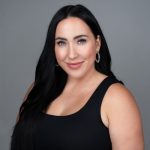 Isabelle Guarino is a vibrant young professional with experience beyond her years. Time spent working for Walt Disney World Company and US Airways shaped her professional development to her current role with AL Family. Isabelle is the COO of the AL Family of companies including the Residential Assisted Living Academy, Pitch Masters Academy, Residential Assisted Living National Association, Four Homes to Freedom, Family Legacy Homes and Residential Assisted Living National Convention.
Isabelle Guarino is a vibrant young professional with experience beyond her years. Time spent working for Walt Disney World Company and US Airways shaped her professional development to her current role with AL Family. Isabelle is the COO of the AL Family of companies including the Residential Assisted Living Academy, Pitch Masters Academy, Residential Assisted Living National Association, Four Homes to Freedom, Family Legacy Homes and Residential Assisted Living National Convention.
With a degree in Human & Family Development and minors in Religious Studies and Communication, Isabelle’s skills are broad and far reaching. She enjoys all organizational tasks, planning and running corporate events, leading teams to reach their financial and personal goals. In college, Isabelle was Chi Omega’s elected Secretary but she also took on leadership roles in every job or club she has ever participated in.
Isabelle loves to volunteer her time and skills to missions work across the world, bringing donations, helping build different projects and sharing God’s Word. Isabelle runs her own charity trips to Jamaica bi-yearly to help donate time and money to Denham Town’s Gold Age Care Home. If you need something to get done quickly and properly, you know who to call! As of 2022 Isabelle has started taking the stage for RALAcademy as their leading lady and lead educator on the topic of senior housing. She is an excellent speaker carrying on her father’s legacy of “Doing Good & Doing Well” with RAL!
——————————————————
To listen to the EXTRA portion of this show go to RealEstateInvestingForWomenExtra.com
Learn how to create a consistent income stream by only working 5 hours a month the Blissful Investor Way.
Grab my FREE guide at http://www.BlissfulInvestor.com
Moneeka Sawyer is often described as one of the most blissful people you will ever meet. She has been investing in Real Estate for over 20 years, so has been through all the different cycles of the market. Still, she has turned $10,000 into over $5,000,000, working only 5-10 hours per MONTH with very little stress.
While building her multi-million dollar business, she has traveled to over 55 countries, dances every single day, supports causes that are important to her, and spends lots of time with her husband of over 20 years.
She is the international best-selling author of the multiple award-winning books “Choose Bliss: The Power and Practice of Joy and Contentment” and “Real Estate Investing for Women: Expert Conversations to Increase Wealth and Happiness the Blissful Way.”
Moneeka has been featured on stages including Carnegie Hall and Nasdaq, radio, podcasts such as Achieve Your Goals with Hal Elrod, and TV stations including ABC, CBS, FOX, and the CW, impacting over 150 million people.
REI Expert Panel Discussion: What You Need To Know About Real Estate Investing
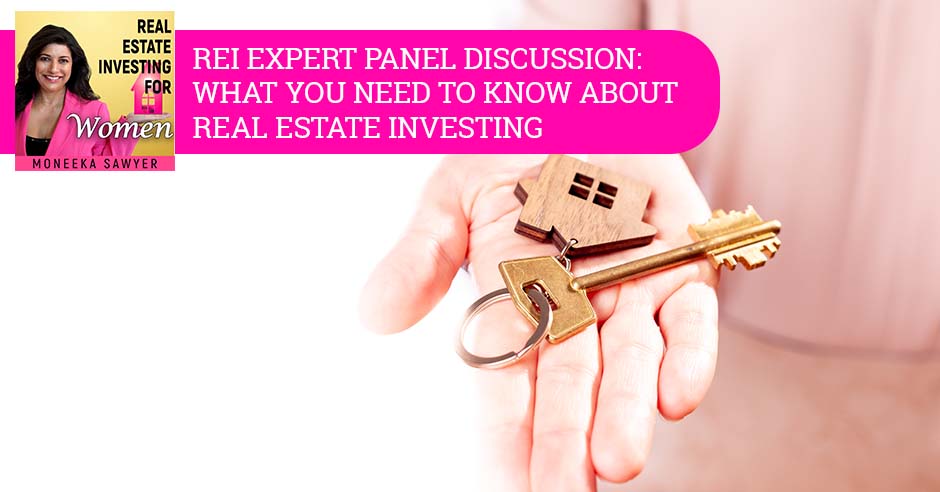
Have you always wanted to get into real estate investing but didn’t know where to start? Then this episode is for you. Today, Laura Powers hosts a real estate investing panel with some amazing experts, Henry Washington, Mike Denman, Patricia Berman, and Moneeka Sawyer. Having their fair share of success in real estate investing, the panelists break down barriers to entry in real estate investing. They make it simple and inspire people to know that no matter where you are, it is possible to get started with real estate investing. Enjoy!
—
Watch the episode here
Listen to the podcast here
REI Expert Panel Discussion: What You Need To Know About Real Estate Investing
Real Estate Investing for Women
I was on a real estate panel with some cool people and the conversation was fantastic. I wanted to share that with you. That’s what this episode is. I hope you enjoy it.
—
I’m so excited. I’m hosting this Intro to Real Estate Investing Panel with some amazing experts. I’m so excited to have all of our participants and experts here. A little bit about myself. My name is Laura. I’m a psychic medium. I do a lot of different things. I describe myself as a creative entrepreneur. As I started to make more money, I felt the need to learn more about money, how to invest property and how to be smart with money because I didn’t have that growing up in my family. It’s been something that I had to undertake on my own independently. If you don’t know how to handle your money and you get more, you will not accumulate more money, which is the desired goal for up for most people.
Even though I would not describe myself as a real estate investment expert, I’m a novice but I do know all these amazing people that are better at it than I am and that is farther along in their journey. In talking with all of these individuals, I realized they had so much amazing knowledge to share. In particular, focusing on new investors. There are lots of great tips and tools.
It can be somewhat intimidating to start investing in real estate when you’re a beginner, so part of my goal for this panel is to try to break it down, make it simple and inspire people to know that no matter where you are, it is possible to get started in real estate investing. That’s a little bit about me and why I wanted to host this panel. We’re going to introduce the experts one by one and then we’ll dive into some questions and answers.
First, I want to introduce Henry Washington. He’s an author, entrepreneur and real estate investor with more than 70 rental units and dozens of house flips under his belt. He built his rental portfolio in three and a half years. That’s so amazing. I was talking with Henry in my podcast and I said, “This is the length of a Bachelor’s degree if you think of the amount of time in your future for a degree.” That’s what he has done and has these incredible shifts. Henry is the newest co-host of The BiggerPockets Podcast and cast member of the BiggerPockets show On the Market. Thanks so much for being a guest, Henry.
I’m so happy to be here.
Is there anything you’d like to say before we introduce the other guests?
I’m happy to be here. This is super cool what you’re doing. I’m very passionate about real estate investing as a vehicle to build wealth. I love how you’ve mentioned that if you don’t learn how to handle your money, your money will handle you. Everybody wealthy owns the property. Even if you don’t use real estate to build your wealth, most people then put their wealth into real estate to grow it. I love that you’re trying to educate people on how to not only make money but how to continue to have that money grow. Kudos to you.

Real Estate Investing: Real estate investing is a vehicle to build wealth.
Thank you. That’s a huge goal of mine and with inflation being 9%, it’s more important now than ever. We met at this real estate investing track. I was struck by Henry’s story and how he didn’t have a lot of money saved up. I wanted to give people that background and that’s how we connected. It was inspiring to me because I want everyone to know that you can get involved in real estate even if you perceive that you don’t have capital. There’s always a way. I’m so pleased to have you.
Let’s go to Mike Denman. He is an award-winning filmmaker based out of Denver. He’s worked in marketing advertising for video games since 2011 and real estate since 2015. He’s been at the forefront of technological advancement and connecting people to content through internet apps like Instagram, Facebook, Pinterest, YouTube and many others.
He’s adapting his real estate advertising tactics to encourage higher amounts of traffic to short-term rental listings as possible due to his years of iterating the process. He’s been a real estate investor for years. We met through the film industry. I have learned that there are a lot of people that are in film and TV that use real estate investing to build a platform, which is amazing. Mike, go ahead.
Real estate is powerful. When we met, your podcast was first starting and you were seeing where all the trajectory went. You realized real estate was a thing that you wanted to get into. I, separately with Patricia, ended up going through the real estate investing side because she was like, “I want to get more into real estate.” It’s a natural progression but from two different angles.
Mike, I would love to hear if there’s anything else you’d like to share.
A fun thing about how we met is we met at the Women in Film & Media Colorado division. It was a female-led organization that still allowed male members. I was part of their marketing committee for a year or something like that. That’s when I met you and ultimately, all the trajectories that we’ve gone. It’s interesting because of your trajectory when we met, your podcasts blew up and all of these little pieces of the puzzle.
Having the real estate aspect be something that you found is like, “I’m going to put money into money-making things.” This is a surefire approach because everyone knows that you can increase your wealth with real estate. It makes sense that a lot of filmmakers and other people are like, “I have all these things but I don’t have a traditional 401(k).” Real estate becomes a cool add-on to it. It’s all super fun stuff.
I don’t think everyone knows. If you were in creative work, that’s often not as reliable as a regular paycheck because you tend to do a lot of freelancing or any other kind of freelancing work where you don’t have a regular paycheck, then something like this that can build wealth and have income that’s not tied to a paycheck is valuable as well. One of the stats I heard is that the average millionaire has eight or more sources of income. It’s also great for diversifying, even if real estate isn’t your main thing, what a powerful thing to be able to have at least one of your pockets of income.
Our next guest is Patricia Berman. She’s been a real estate investor since 2014. Patricia’s real estate journey began in 2014 with purchasing a primary residence and selling it two years later with a nice appreciation, repeating that process while holding the previous primary residences and running them out as long-term rentals. After a long stint investing solely in the Colorado market, she expanded to Iowa, Texas and California.
In 2022, Patricia took her love for hosting and service and dove into short-term rentals. She is successfully doling out hospitality by managing her two vacation properties with her partner, Mike Denman. Patricia is writing a book on leverage and she hopes to help other people find the courage they need to jump into real estate on their terms. Thanks for joining us, Patricia.
There are many ways to dip your toes into real estate, be successful, and get that stream of income happening for you, no matter what you do, no matter what your strengths are. Share on XThank you so much for having me. I’m so excited to be here and talk about real estate. I’ve spent a lot of time listening to BiggerPockets and realizing that there’s a style of real estate for everybody. There are so many ways that you can dip your toes into real estate, be successful and get that stream of income happening for you no matter what you do and what your strengths are.
I found what I love. We are invested in some long-term rentals but short-term rentals have souped up our portfolio. It’s not for everybody but I love it. The important message is to find what you love in real estate and do it on your terms. That’s what we’re doing. I want people out there to know that you can do this and it’s important to build wealth.
Another reason I wanted to host this panel specifically is that there are so many different ways to approach real estate. The more I got into it, the more I realized that you could flip, hold for long-term and do long-term rentals. You can do short-term rentals.
Also, house hack.
There are so many different ways like multifamily. It opens that door for people to see the different ways. In your case, you’re doing many of these different models. You’re not doing just one but based on your personality, one or more approaches might work for you. If you think it’s about flipping or short-term rentals to open your idea about the different ways that you can approach this, then find a real estate investing pattern and a method that works for you.
It doesn’t have to be one thing or another.
I’m going to introduce Moneeka Sawyer. She is the host of a talk-related podcast, Real Estate Investing For Women. Her expertise and joyous laugh have been featured all over the world in over 50 podcasts, on stages, on radio and TV stations, including ABC, CBS, Fox and The CW. Her multimillion-dollar real estate empire is only one example of her ability to strategize, organize and implement big business plans.
She is the bestselling author of the book, Choose Bliss: The Power and Practice of Joy and Contentment, which has built a multimillion-dollar business through real estate. Moneeka teaches others how to create a blissful and abundant lifestyle. She has traveled to over 55 countries and loves to teach others. I’d love to start with a question to the panelists. If you were starting from square one, what do you recommend? You’re like, “I’ve never invested in real estate. Where do I start? What do I do? What do I learn?”
It depends on age but house hacking is one of the best ways to start a real estate portfolio, especially in this market when you’re looking at something where interest rates are rising and there’s a little bit of uncertainty in the market. Use what you have. When you purchase as a primary residence, you’re going to have access to lower interest rates and reduce your overhead by either renting out extra rooms in your house. If you don’t want to share a space with other people, you can get up to a four-unit property and rent out the other units.

Real Estate Investing: House hacking is one of the best ways to start a real estate portfolio.
I am a big fan of house hacking. We even did it as a family where we had one extra room and rented it out to women who were single moms and stuff like that. We’ve vetted super well and it worked out well for us. We made a lot of lifelong friends that way. That’s one of the best ways to get started. There are many but that’s my go-to.
There are so many ways to go about it. One of the things that’s interesting to me is even when it’s a tough market for buying and selling as a whole, it’s still a good rental market. Keep that in mind that even if it’s harder to buy something, you might be able even more easily to rent it because people that would be buying aren’t buying. Either Mike or Henry, I would love to hear your responses too.
My response is the same as Patricia’s because that’s the trajectory we are going on. What do you think, Henry?
Getting started is super intimidating to people and it’s, even more, intimidating given the economic environment. People are concerned, “Am I buying at the top of the market? Am I paying more for the money for higher interest rates? Is there going to be a crash?” This war overseas is pushing prices of commodities up. People are like, “Is this the right time?” The answer is it’s always the right time. It’s a matter of what and how you buy.
When I’m talking to people about getting started with real estate investing, the majority of it is about your mindset around real estate investing. We’ve all mentioned it multiple times already in the short time we’ve been on the show. There are so many different ways to invest. A lot of those ways to invest are going to be more beneficial for one person versus another based on their financial situation.
To be able to tell you this is the best method for you is not easy to do without knowing what your financial situation is or what your super strengths are. What people should focus on is first making a decision, deciding you’re going to buy a property, even though you don’t know how or you don’t have the down payment. Maybe you think you don’t have the credit or you can’t find the property to buy. All these factors are going to come into play that we will tell ourselves is a reason we can’t do something.
Take all that off the table and say, “I am going to buy a property in the next 3, 6 or 12 months,” whatever that is for you. You have to make that decision in your mind and heart. Once you are solid on that decision, you’ll figure out a way. The show will reveal itself to you. Here are Laura, Patricia and Mike. You’ll know something that somebody says about a path that maybe makes sense for you. Patricia talked about house hacking. Maybe somebody who’s made the decision to start investing in real estate didn’t know about house hacking but now they know.
They’re going to go do some research and maybe that’s how they get in the game. When you’re starting, it’s more about deciding. “No matter what, I’m going to figure out how to do this and do it.” I promise, once you’ve truly made that decision and you keep immersing yourself in real estate investing culture, information and knowledge and surrounding yourself with people who are successful real estate investors, you will figure out a way to do it.
There’s a way to do it with no money, with some money, with other people’s money and when you buy deals on the market or off the market like house hacking. There are short-term and long-term rentals. One of these strategies will make sense for you. You only have to make a decision that you’re going to continue to educate and surround yourself with people who are doing it. Until that path reveals itself, you got to go down that path. That’s what I tell people who are getting started.
When you keep immersing yourself in real estate, investing culture, information, knowledge, and surrounding yourself with people who are successful real estate investors, you will figure out a way to do it. Share on XForgive me. I’m having a lot of problems too. The universe is saying something and I’m not sure what that is. I heard what Henry was saying and one of the things that I say on my show is goals without action are just dreams. Get out there, take action and create the life of your dreams. What everybody here is stating is first, Henry says you have to make a decision. Everything in our lives starts with a decision and a choice to follow that decision. Once you make that decision, action has to follow because otherwise, it’s only words in your head.
I loved what Henry was saying. I’m so sorry that I missed what Mike and Patricia said. It’s important that we make a goal and make a choice to take action towards that goal. That’s how we create the wealth and the blissful life that we want. I do want to go back and make a couple of comments about what Laura said. She said that most rich people have eight sources of income. Don’t misunderstand that by thinking that it was eight sources of income that you work. It’s not.
Most of those sources of income are passive and the things that rich people work at are the things that they’re passionate about. They’ll have one thing maybe that they are passionate about and they pour their heart into but these passive sources of income are what create the wealth. Henry also said that most wealthy people own real estate. That’s true. They may not have made their money there but that’s where they put their money later, which is what Laura is doing.
She’s modeling that for us, which is beautiful. You have to understand that 8 sources of income do not mean you need 8 jobs. Passive income is the key and real estate is the most stable way to get that passive income. The other thing that I want to say is there are 1 million ways to make $1 million in real estate. Choose one. As Patricia says, there are so many.
The action doesn’t need to look like you went out now and purchased a property. Listen to podcasts like your podcast, the BiggerPockets Podcast and to all of these successful people who have done it in different ways. When you hear one that makes you excited like, “That sounds great.” That’s what I did. Even after I had become a real estate investor, I listened to one with Zeona McIntyre and Avery Carl. I was like, “I’m going to get into short-term rentals.” You have to listen to your gut and heart but start consuming that information because that’s the only way.
That’s the only way that you’re ever going to learn what the opportunities are out there.
Maybe for some other people, it’s not listening to the podcast. Maybe it’s going to Meetups because those are another way.
Networking is a big deal. Thank you so much for mentioning that.
Our community of investors is so huge, welcoming and helpful that it’s like, “Get in where you fit in.”

Real Estate Investing: Goals without action are just dreams.
You have to understand that because someone else is successful does not mean that you have to do it their way. I love what Henry was talking about. He built all of this passive income in three and a half years. I retired myself in fifteen years because that’s the goal that I had and the choices that I made from my lifestyle. I traveled to 60 countries during that time. I have all these other things that I love to do.
Although I wanted passive income to retire, it didn’t need to happen in three and a half years. I had the time. As you’re looking at what is going to fit for you, understand that Moneeka or Patricia and Mike, Henry’s way or whatever Laura’s way turns out to be, I’m excited to hear, whatever our ways are, it’s opportunities for you to learn but it’s not necessarily going to reach your goals in your way. The way to stay blissful is to make sure that you understand yourself and create a strategy that supports your joy, as well as your wealth. You can have both. I hope that was what you were looking for, Laura.
The next question that I have is, what is your first real estate investing story? What got you into real estate? How did you get started? Let’s start with you, Henry, because one of the reasons to host this panel was to hear your story at Podfest.
I got started a few years ago out of desperation and panic. I had a panic attack because I was freaking out that my wife was going to figure out that I sucked at money and dollars and wasn’t going to be able to afford to provide her with the life that she deserved. I came to that conclusion because we got married fairly quickly. I met my wife and then we got married 365 days later. That was a quick physical transition but as far as mentally and financially, those things didn’t move as quickly as we did. It’s when we decided that we wanted to get married.
I had a wake-up call when we tried to buy a house together. We did all the things. I felt that I did all the things that society tells you to do. I got good grades. I went to school. I got a good degree and a job. I was doing software development and data analytics for Walmart. I was making a great income. We got married and went to buy a house. I’m like, “This is great. I make twice as much as she does. We’ll be able to afford this great house.”
The bank pretty much called me one day and said, “If you want your wife to be able to buy a house, you can’t be on the loan.” My credit was so bad. I made money but I didn’t have any money. There was $1,000 in my savings account. To a bank, I wasn’t bringing anything to the table other than the fact that I had a W-2. That was a big blow to my ego and to me as a person who wanted to provide for my new wife. I got punched in the gut as far as my ability to be able to do that. I had another wake-up call when we were having a conversation one night.
My wife bought that house and allowed me to live with her. Once we moved in, we did the other thing that married couples do, which is talk about your future, kids, dream houses, vacations and things. That’s supposed to be a fun conversation and it wasn’t. For me, I was terrified because I was like, “It’s a dream house but we barely got in this house. I don’t know how to dream house is going to go.” I knew I couldn’t afford it.
It was a starter home. It was a nice home but it was small. After that conversation, we went to bed and I woke up at 3:00 in the morning sweating and panicking because I knew she deserved things that I had no idea how to afford. I had $1,000 in my savings account. I had bad credit, so I did what anybody would do. I started googling, “How can I make some extra money?” That brought me to discovering terms like passive income.
I was like, “How can I make extra money without doing anything?” I started googling how to make passive income and that led me to articles on BiggerPockets and YouTube videos around people who invest in real estate. That was the first time I heard that real estate investing was something that normal people did. Up until that point, I assumed that super-rich people in big companies and things owned real estate and that’s the way it worked. It was an eye-opening moment for me to see that normal people with jobs, kids and families are owning property and they do it all the time across the country. It was mind-blowing to me.
Everything in our lives starts with a decision and a choice to follow that decision. Once you make that decision, action has to follow because otherwise, it's just words in your head. Share on XI ended up watching this TED Talk from this kid who was 27 years old and had 27 properties. The whole goal of the talk was he was financially free and he used rental properties to get there. I was like, “If this kid figured out how to buy twenty houses and be financially free, I could do it.” I went like, “I’ll do that.” With my bad credit and $1,000 in my savings account and being denied the loan for the house that I was living in at the time, I decided at 3:00 in the morning that I was going to buy real estate. That’s what I did. I woke up my wife and said, “We’re going to be real estate investors.” She was like, “Let’s do it.”
I didn’t know how to do it but I had made a decision. When you decide something, the suffix of the word decide is cide, like suicide. It means to kill off. There’s no other option but to do it when you make a decision. Once I did that, I was like, “I’ll go find people who do it and hang around them a lot until I figured out how to do it.” That’s when I discovered REIA meetings and real estate Meetups. If there was a meeting in my area, I got in the room every single week or month consistently. I wanted to learn and surround myself with people who were doing it so I could learn how to do it.
Between that, I was telling people that I was a real estate investor with only $1,000 and bad credit. I’m a believer that the universe gives you what you put out. If you don’t put out there that it’s what you are and that’s what you want, why is anybody else going to believe you? Why are the things that you’re looking for going to find you? They have no reason to. I was like, “I’ll tell people I’m an investor. Hopefully, that brings me the thing that I want.” That’s 100% how I found my first deal.
Somebody who heard that I was a real estate investor was a friend of mine. He was like, “I heard you’re buying property. I got to sell this house in 30 days. Can you buy it?” I was like, “I can buy it.” I had no clue how to buy it. I ended up putting that property under contract and found out how to do that because I googled how to buy a house without a real estate agent. It said, “Put it under contract.” I googled, “What’s a real estate contract?” I downloaded one, changed the names and we signed it. That’s a terrible idea and people shouldn’t do it but I did it. I was like, “I’m going to figure this out.”
I had to buy it and take it to a bank. The bank said they’d give me money as long as I had 15% of the down payment. They said, “Do you have it?” I was like, “For sure, I have it.” I didn’t have that either. I had to go to my group. That was the power of networking. You mentioned that networking is so powerful and I 100% agree. People don’t leverage networking enough. Everybody goes to 1 meeting or 2 and they network but that’s not networking. That’s only going to 1 meeting or 2.
Networking is consistently showing up and being around everyone who’s doing the things that you’re doing. It’s not only going to 1 meeting or 2. It’s committing to being consistently in those circles because the more consistent you are in those circles, the more people see you as an expert, the more the universe is going to send the right people in deals and things your way. I was so consistently in this group that I had this network of friends.
This investor group is so helpful. They want to see you succeed. People want to help you out. You hear wholesalers say, “Somebody is going to steal your deal.” It’s not like that in real estate. It’s more, so somebody is going to help you make money on your deal. Everybody’s so helpful. I went to my network and I was like, “I got this house. It’s a great deal. I don’t know how to buy it. How are you buying it?”
They talked me through how to go find the money. Somebody said he could leverage a 401(k) to buy it. I was like, “I will have to go find a 401(k).” My wife had the 401(k). I went to her and I was like, “Remember that time I said we’re going to buy a property? We need to borrow $20,000 from your 401(k) to buy this house.” She said, “Let’s do it.” We bought the house. The bank called after we bought it and said, “That house had a bunch of equity. We’ll give you a line of credit on the equity so you can go buy more deals.”
I went from a panic attack to owning a house 90 days later and the bank calling me and saying, “Here’s $20,000 to go do it again.” That is mind-blowing when you’re panicking about money 90 days before that. That’s my intro to real estate investing and what changed my life. Once I bought that first one and I saw how powerful it was, I said, “I’m going to buy as many as I can as fast as I can.” That’s how we got into it.

Real Estate Investing: Real estate is the most stable way to get that passive income.
It was such an inspiring story. That was a big motivation for me to host this particular panel. I love this because so much of this is about faith. It’s about making a decision that something’s going to happen, even if there is the perceived idea that you don’t have the resources or you don’t know how. Also, get in the room. Connect to the people that are doing it. Learn from them and get connected with a supportive network. I’d love to ask that same question to Moneeka. Can you share your intro story to how you got into real estate investing and what happened to you?
My intro story to real estate happened before I was born. It started with my parents. They had an arranged marriage in India, came to this country with $200 in their pocket and didn’t know each other very well. Suddenly, they’re starting a new life because things were bad in India. They wanted a better life for themselves and their family. One of the things my dad had heard was that the golden ticket to wealth in the United States was to buy real estate. They’re thinking about this. They want to buy a primary residence.
My mom’s a doctor and my dad’s an engineer. My mom is saving all of her nickels and dimes that she makes. She’s sewing little cushions for her sofa that she made. She’s making curtains. Imagine this doctor doing all these things and saving every nickel and dime so that they can buy real estate because that’s the dream. I was born 2 years later as their 1st child. Filled with that feeling of love, joy and hope for this new baby, they finally bought their first home. They bought their primary residence and then also an investment property soon after that.
They bought their primary residence when I was born. Three years later, they started their investing journey. It’s been my whole life. Fast forward fifteen years, they were able to pay for my college education and my wedding with real estate. They did the same for both of my sisters. My whole life, I had seen what real estate could do. I’d also seen my dad’s stress with tenants not paying rent, dealing with the different mortgages and juggling all the different phone calls from their tenants, the toilets and the termites. We hear about this stuff and this is what scares people away from it. I saw that.
I have to tell you, I had dug my heels in. I was like, “I do not want that life.” One of these things that I learned about real estate was it’s a long game. You want to be in there for a long time. If I was going to do a long game, I was not going to do something that was going to be miserable. I was clear on that. I decided, “No, thank you.” I graduated from college during a recession. I couldn’t find a job. I had a great degree from UC Berkeley.
I remember one day sitting with my dad and I’m like, “How am I going to do the adulting thing? What’s going to happen to me?” My dad said something to me that night that changed everything. He said, “Do you know, Moneeka? Everybody has stress, fear and money problems. Do you want poor people’s money problems or do you want rich people’s money problems?” My first thought was, “Do rich people have money problems?” They do but they are better problems.
My whole mindset changed. It was like, “I want this.” I got a low-paying job. I took whatever I could get. I swallowed my pride with a UC Berkeley degree. I did what my mom did. I started saving nickels and dimes so that I could buy my first piece of real estate. In the meantime, I fell in love. My sweet husband and I decided we wanted real estate. For our wedding, we asked everybody no gifts. We wanted a down payment for the house. Everybody gave us money.
We put together $10,000 and then went for an FHA loan. We’ve tried that but it didn’t work for us. We put down 5% on a $200,000 property. We were broke but we had this house. This is how we got it. In those days, we called house hacking getting a roommate. We got a roommate and that’s how we afforded our first house. We lived with this roommate for a few years. We got an equity line on the home once it had appreciated and then did it again. We rented this out.
That’s how we got started and the rest is history. My very first rental home was a nightmare. It was like my dad’s because that’s what I had learned. That’s what had been modeled for me. We sold that first property. My husband’s like, “You are so going to regret this,” and he was not wrong. We got rid of that property because I was like, “I can’t stand this headache,” but then with the next one, I realized what real estate could do for us.
Just because someone else is successful does not mean you have to do it their way. Share on XHenry, thank you for that decision idea. I made another decision that this was going to be the thing that I did but it was going to be happy for me. I was going to create my model. I was going to streamline my processes. I was going to create something that I could live with for the rest of my life, which is what I did. That’s how I began. For the first 4, 5 and 6 years, I would buy a primary residence because they’re the easiest to get into. They require the lowest down payment. The loans are easy to qualify for. You have to pay rent, so you might as well pay yourself.
I buy another primary residence and then rent that out. That’s how I got started until, eventually, I had enough equity in my homes that I could go shopping. It was like a monopoly. “I can go buy ten,” but it took a little time to get there and I had given myself the time. I wanted to do this in a way that felt good to me. That was my journey.
It’s important to focus on doing whatever you need to and get it going. It may not feel easy in the beginning. When you’re starting something new, there’s a certain amount of resistance you have to work through. That’s one hard part. The other thing is making decisions that may be in the short-term don’t feel the best but in the long-term are going to be beneficial. You have this pocket of money and put it into the house, so you don’t have that money anymore. That can feel not so great. You’re like, “I don’t have that $10,000,” or whatever it is that you put into a house or, “I’m getting a roommate.”
In the long-term, that’s going to be a good decision. Not to get too caught up in whatever’s happening at the moment. If it fits into your long-term vision for yourself, know that it can be worthwhile. It was on another podcast interview where you talked about how when the recession hit, the housing crashed. You made the tough decision to move out of your house and rent it so that you could keep it. That was not easy but in the long-term, it was a great decision for you.
There’s no clear path to wealth. One of my coaches said to me, “The person with the most flexibility wins.” The word pivot was used during the pandemic a lot. If you’re able to dance with what’s happening out there in the world and your life, you’re going to be able to create more of that wealth more easily. Many people that were in my situation lost everything. I lost several million dollars in six months in 2008 in 2009 but I made some different decisions than other people. I didn’t freak out, get scared or think the market was ever going to come back.
I decided, “This sucks. What am I going to do?” What I was going to do was hold my properties and figure out how to make it work. All of us have choices in every moment. Our knowledge, as Henry, Patricia, Mike and everybody’s talking about is to get educated. As you’re in those environments hearing the conversations and you’ve got that education, it makes it a lot easier to do that dance, pivot and change your strategy based on what’s going on. You’ve got a wealth of information that’ll help you to build your financial wealth.
That story made me want to give your mom a big hug. To come over here with $250 and she started saving her nickels to help buy that property, I want to hug that lady.
My parents are amazing. I’m so blessed.
Another thing to stress is it seems to me there is likely to be another recession here with inflation being so high. We’ll see how long and serious this goes but it still can be a good time for you. That doesn’t mean that it’s not a time to be in real estate or you’re going to lose everything. You have to be aware and make smart decisions based on what’s happening.

Real Estate Investing: If you can dance with what’s happening in the world and your life, you can create more of that wealth easily.
With that determination and will, you can still make it work even in this perceived challenging time. Most millionaires are made and billionaires too, often in times of economic downturn. What is challenging in some ways is a bigger opportunity in different ways. Much of this is about reframing as well.
Real estate is the best recession-resistant vehicle to invest in because rents go up as inflation goes up. There are other factors too. That’s oversimplifying it but real estate is the vehicle that can help us to weather that inflation storm, depending on how you invest.
We were talking before about how everybody needs a place to live. Maybe eventually it’ll be fully in VR and that won’t even be the case but at least for the perceived future, people need a place to live. People will always need that, whereas other things are negotiable. You need food and a place to live.
Real estate is a finite resource. A lot of people don’t realize that, especially in areas where growth has already happened and there are restrictions on open space and building. Considering the idea that it’s a finite resource, you got to get yours.
Where people can work from remotely anywhere, it’s opened up a lot more different real estate markets that people hadn’t necessarily considered living in before because they’re like, “It’s not accessible to my job.” These rural markets have amazing and affordable properties. Even when we went out to Iowa and we started doing our long-terms in Iowa, it was this scary first out-of-state thing. It was freaky but it works out because different areas have different regional economics. Ultimately, you can invest with lower amounts of money but still bring in some cashflow.
We cashflow beautifully on properties that we purchased for $125,000 each. People need places to live. They need nice, beautiful spaces. To build on what Henry and Moneeka said, it’s important in real estate. You want to sit with yourself and figure out what your strengths and weaknesses are. What do you want to do? What energizes you? The best way to be successful is to be authentically yourself. I try to tell people this all the time. Be authentically yourself. It’s a struggle for us. Every day, I’m wondering, “Maybe I should do this but that doesn’t suit me.” I’m trying to always center back on being authentically ourselves. When you are, you have more potential to get further.
I’ll comment on the whole flexibility thing. If you’re ultimately not a real estate investor and you think about being flexible, it’s that uncomfortability of having a roommate or those things where you wouldn’t necessarily normally do it. If you move out of your house for a little while, which we’ve all done, you move out of your primary into another primary, you get that primary going, the house is where you make a home at that moment and it’s a thing you’d build on, you get a little bit uncomfortable for some periods. You have to be okay with some of those levels of comfort. It’s like, “You can go a couple of years without having a walk-in closet that you love.” If you have a place that you are like, “This is going to be great to rent out,” spend a year there and then move on to the next property.
Wealth is built outside of your comfort zone.
One of the things I tell my tenants is, “You’re paying my mortgage. She can sit there paying your own.” I tell my tenants to leave me. I’m telling everybody, “Leave your landlord,” because you’re going to pay somebody’s mortgage. When the recession got tough, my husband lost his job and stuff like that, when we moved out of our dream home, where we built our whole life together. We finally bought our dream home and then we needed to rent it out.
The more consistent you're in networking, the more people see you as an expert, and the more the universe will send the right people and deals and things you're away. Share on XHe finally got a job and we moved into a dump. When I walked in there, it smelled like dog pee. Everything inside has been spray-painted gray. It was horrible. I walked in there and broke down crying but it was all we could afford and they will not pay rent. We had to buy it because that’s one of my policies. Don’t pay somebody else’s mortgage. Whatever we could do is what we did and it worked out beautifully in the end. That flexibility thing is so important. It can be your superpower to build that flexibility muscle.
This is good in life, not just real estate investing, if you can see the whole picture. We’re getting close to the end of the hour. Patricia and Mike, briefly, if you could share a brief version of your first real estate investment and then we’ll wrap up.
I’m originally from New York. I grew up in Brooklyn. This is a very rent culture city. Unless your parents had generational wealth and had a home that they owned already, you typically rented and don’t buy because it seems so daunting and scary. I moved out to Colorado in 2011. I purchased my first home ever in the beginning of 2012 for $305,000. Two years later, we sold it for $400,000. Even to purchase that house, I took a loan against my 401(k) to make that happen. I love paying myself back.
Henry said I didn’t know how I was going to fund the down payment. I thought I would take money out of the disbursement but I was researching and found out you can take a loan against your 401(k). You pay yourself back with interest and I was all about that life. I also learned that it doesn’t hit your debt-to-income ratio. That’s a small tidbit for people out there.
I was bit by the bug. I bought another place in 2014 for $245,000. I sold it 2 years later for $320,000. I was like, “I am getting into real estate.” I made that decision because this was working out. Why wouldn’t you get into real estate? This is crazy. The Colorado market had risen quite a bit and it continues to appreciate year over year for crazy numbers. That’s where it was.
I started by renting out a room. We then moved out and bought another place and rented that place out. We moved out of that one and rented that place out. That’s how we built our real estate portfolio and gained access to home equity lines of credit. That’s how our journey began. In 2021, we sold one of our most appreciating properties.
We jumped into the short-term rental market with a lot of appreciation that we had gained on one of the houses that we owned in Golden. Here we are and we’re doing well. We own two short-term rental properties plus our long-term. We plan on continuing this journey of purchasing long-term and maybe purchasing another luxury short-term rental.
I do advertising mostly for video games and real estate as well because I like it. When she started doing short-term rentals and came to me saying, “I’m not getting any bookings,” I was like, “It’s okay. I’ll run some ads.” She’s like, “Don’t tell me it’s okay.”
“What are you talking about? Do you know what the mortgage is?”

Real Estate Investing: Real estate is the best recession-resistant vehicle to invest in because rents go up as inflation goes up.
I’m like, “That’s all good.” I’ve been running advertising on Facebook, Instagram and different things like that for so long, especially for real estate. I was like, “This is going to be easy.” I started running ads for short-term rentals and it got easy. We were able to bring in massive amounts of people and increased our Law of Averages to get bookings.
I have this lever I can turn on and off and she feels like, “We’re getting views and bookings. I feel like it’s normal.” I’m like, “It’s cool.” I’ve been able to take that, create a system, help out a bunch of other short-term rental hosts and develop even advertising methodologies for them to follow us that way so they can find success on their own. I’ve pivoted my business a little bit to focus more on that in 2022.
I wrote a book, How to Excel at Short Term Rental: Advertising. I have a whole bunch of things happening in the real estate investing side of things, shifted and pivoted more of my day job focus and then I’m like, “I have more fun and a little bit more exciting times. I get to talk to all these cool real estate investors.” Instead of making the videos for real estate investors who are 20-year-old kids who learned how to wholesale at 18 and have 30 properties, which is amazing.
I was like, “I don’t know how to do that.” To Henry’s point, I was like, “You have to surround yourself with these people.” Ultimately, when you start talking to other investors and we find the different flavors of real estate, there are all these things that you can end up benefiting from by providing services for it.
I’m glad that you brought up short-term rentals because that’s a viable option. It’s a very different business model but I was talking with a friend here in Las Vegas who has three short-term rentals that bring in about $1 million a year. It can be real income. You have to know the rules and everything. In certain places, it’s allowed and not allowed. Do whatever you need to do to make sure that it’s legal but it can be a viable path to income.
There’s been a huge influx of investors who were rushing to short-term rentals but that’s where Mike comes in because if you’re treating it like a business, you should be advertising it. The more people who see your property is casting a wider net of people who are likely to book your property without waiting on the platform to get you invested.
There’s going to be a lot of cross-pollination within the panel itself. I’m excited for all of you to connect. I was like, “I can’t wait for you all to meet each other.” For anyone who’s reading, I love these panels. You and everyone can already see how amazing all of these individuals are. They have so much knowledge in different areas and backgrounds, which I love.
If you want to further your connection and learn more about real estate, I’m hosting an 11th-Month Real Estate Magical Mastermind. I’m calling it magical because I know that it will be. All these fabulous panelists are experts in the class. I’d love to have you. You can find out more about that on PowersHour.biz. You can look under the classes.
Feel free to reach out if you have any questions about it. It’s at [email protected] to contact me. I want to thank all of you so much for your time. I’m excited to see what happens, hear more about your journeys and learn more. Even though I’m posting this real estate class, I’m learning from all of you and I’m so grateful. Everyone’s going to learn from you as well. Any final closing thoughts that you have that you want to give out to people as we wrap up? I’ll start with Moneeka.
The best way to be successful is to be authentically yourself. Share on XI already gave you my closing. Goals without action are just dreams, so take action. I do have one other thing that I want to mention that is very relevant because we’re not all real estate investors. Remember that bliss is your birthright, so choose bliss every single day.
Henry, how about you?
I gave some mindset at the top of the show to talk about how to get started. I’ll give some tactical at the bottom of the show. Actual tactical things you can do to get started investing in real estate. You have to put the blinders on because it’s so flexible. There are so many ways to get started. It’s going to be overwhelming. There are so many options for you. Find the lowest common denominator among all the options and that is typically always going to be a good deal. It doesn’t matter how you’re going to monetize a property.
If you’re going to flip it, rent it, short-term rental, long-term rental, wholesale or wholetail it, all of these strategies require you to buy something at a discount that’s a good enough deal so that when you add value to it by fixing it up, putting tenants in it or furnishing it and renting it out, you can turn a profit. If the lowest common denominator is finding a good deal, then that’s where your focus should be. Don’t worry about all the other stuff like who’s going to finance it, who’s going to work on it, who’s the contractor going to be, who’s the title company or who’s the real estate agent. None of those things matter until you find a deal.
Find a deal. Figure out what a good deal looks like in the market. If you’re looking to buy real estate, you can do that simply by networking and asking people what they’re buying. Figure out how you’re going to find those good deals. You can google, “How do I find under-market value real estate deals?” You’ll get a ton of options. It’s direct mail, cold calls, on the market or off the market. There are all these strategies.
Pick the one that you think you can implement the easiest that you can apply the right amount of money and time to. Do it relentlessly consistently until you get a deal. Once you get a deal, you’ll be so motivated to go figure all that other stuff out that I’ve mentioned before because you’ll have that thing in your hand that you so worked hard for. People will line up to give you those resources because you’ve brought them something of substance. Take everything off the table, put your blinders on, figure out what a good deal looks like and be relentlessly consistent about finding one until you do.
Patricia and Mike, any closing thoughts for the two of you?
Be authentically yourself. Sit with yourself for a little while and figure out what your strengths and weaknesses are. What do you like to do as it relates to real estate? What do you think you want to do? What are you willing to try? Take action on those things. Learn more about how you can get involved. If you try something and you don’t like it, you don’t have to stick with it. There are so many different ways to get involved. Most importantly, start educating yourself about the different ways or what it is you want to do.
In the corporate world, Patricia, we call that a SWOT Analysis. You sit down and do your strengths, weaknesses, opportunities and threats. You write them all down. That is your point of attack.

Real Estate Investing: Bliss is your birthright. So, choose bliss every single day.
Also, make the decision. “I’m going to get involved in real estate.” That’s what you got to do. Don’t lose yourself in it.
One thing I’ll leave off with is even after you’ve dove into something, it’s okay to spaghetti test. Everything is a test. It’s not anything you have to commit to. I try a bunch of things at once. I see what sticks, resonates and reflects the value that we have. The reality of investing in the short-term and long-term where we hadn’t done that in 2022 is a freaky thing. Be like, “I know systems that work and the ways in which we can increase some of the viability of it.”
As you go into something, there are always ways that you can increase its effectiveness of it. You can get more investors to even add to it. It syndicates. There are all these things that you can do with other people’s money, like seller financing options. Finding those off-market deals and getting people to even be involved and you renting from the person who owns it. You are paying them their actual fee instead of a bank and you take over the actual deed later on. There is all this different stuff that takes conversation and trying it out. Explore and be unafraid to try new things.
Everyone, thanks for participating. I appreciate your time and energy. I’m excited about the mastermind.
Thank you for having us.
If you’d like more information about me, you can go to my website, PowersHour.biz. You can find me on Twitter @ThatLauraPowers, Instagram @LauraPowers44 and also on Facebook. Thanks for reading.
Important Links
- On the Market
- Women in Film & Media Colorado
- Real Estate Investing For Women
- Choose Bliss: The Power and Practice of Joy and Contentment
- How to Excel at Short Term Rental: Advertising
- PowersHour.biz
- [email protected]
- @ThatLauraPowers – Twitter
- @LauraPowers44 – Instagram
- Facebook – Powers Hour
——————————————————
To listen to the EXTRA portion of this show go to RealEstateInvestingForWomenExtra.com
Learn how to create a consistent income stream by only working 5 hours a month the Blissful Investor Way.
Grab my FREE guide at http://www.BlissfulInvestor.com
Moneeka Sawyer is often described as one of the most blissful people you will ever meet. She has been investing in Real Estate for over 20 years, so has been through all the different cycles of the market. Still, she has turned $10,000 into over $5,000,000, working only 5-10 hours per MONTH with very little stress.
While building her multi-million dollar business, she has traveled to over 55 countries, dances every single day, supports causes that are important to her, and spends lots of time with her husband of over 20 years.
She is the international best-selling author of the multiple award-winning books “Choose Bliss: The Power and Practice of Joy and Contentment” and “Real Estate Investing for Women: Expert Conversations to Increase Wealth and Happiness the Blissful Way.”
Moneeka has been featured on stages including Carnegie Hall and Nasdaq, radio, podcasts such as Achieve Your Goals with Hal Elrod, and TV stations including ABC, CBS, FOX, and the CW, impacting over 150 million people.
Repeat Success – Proven Strategy On Achieving Financial Freedom With Chris Miles
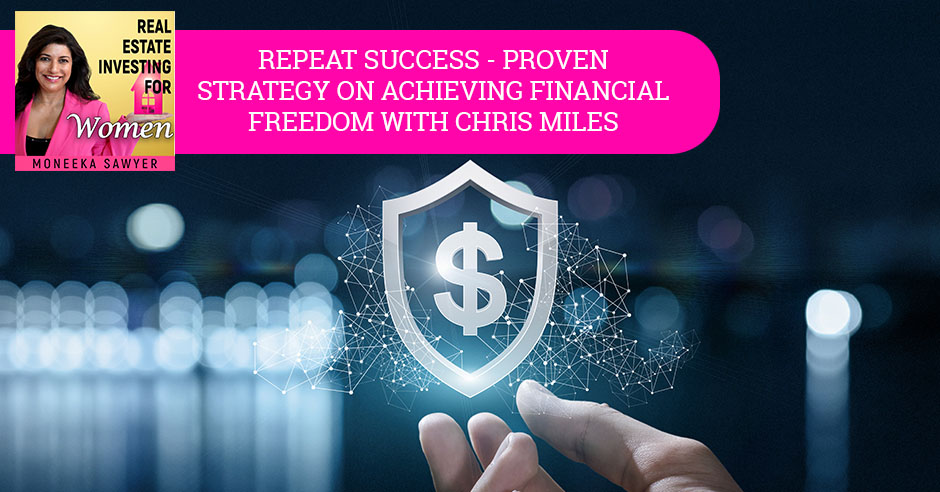
What if you could find your way to financial freedom, not once, but twice? In this episode, Chris Miles, the founder of Money Ripples, tells his inspiring story of highs and ultimate lows and how he bounced back using the same principles that got him to be successful in the first place. Chris tells us how his own values pulled him through foreclosures, divorce, and massive debts. Tune in and get some lessons that will help you understand cash flow, passive income, and achieving true financial freedom from someone who learned the hard way.
—
Watch the episode here
Listen to the podcast here
Repeat Success – Proven Strategy On Achieving Financial Freedom With Chris Miles
Real Estate Investing for Women
In this episode, I am delighted to welcome back to the show Chris Miles, the Cash Flow Expert and Anti-Financial Advisor. He is a leading authority in teaching entrepreneurs and professionals how to get their money working for them. He’s an author and podcast host of The Chris Miles Money Show, which I’ve been on. He has been featured in US News, CNN Money, Entrepreneurs on Fire, and BiggerPockets and has a proven reputation with his company, Money Ripples, getting his clients’ fast financial results. In fact, his personal clients have increased their cashflow to almost $300 million in the last few years. Those numbers are incredible. I’m so excited to have you chatting with our ladies again. How have you been?
I’ve been great. I appreciate being back on, Moneeka.
Chris, could you give us a two-minute high-level story about how you got into what you’re doing?
Yeah. Funny enough, it wasn’t planned like a lot of things in life. Life takes you on the course it needs to take you. I was planning to become a business consultant, but I figured if I was going to do that, I should have real-life business experience. I figured I was going to drop out of college, take a one-year sabbatical and go find some business, some side hustle I could do.
I was looking around and the first opportunity that came up that zinged a little bit was becoming a financial advisor. Granted, I had no financial experience. I took a few little high school accounting and banking classes. I knew how to write a check and balance a check register back when we used check registers. That was it.
My dad only taught me to save. That’s all he taught me to do. While my mom was an artist, she was trained by the master painter that trained Bob Ross. She had this entrepreneur thing, but it was easy to come easy go with money while my dad was, “Save it and hoard it.” I didn’t know anything and I did that. She was a financial advisor. I stayed dropped out of college. I never went back. I never finished my Bachelor’s. I was one class away from finishing.
I ended up staying as an entrepreneur. I stayed as a financial advisor. I did that for a number of years. After a while, I’m one of those people who like evidence. I like to know that things work. I started to realize that even as I inherited clients from previous financial advisors, they weren’t financially free. They were still struggling, just like every other American. I had to ask myself. I’m like, “Is this working?” When your pocketbooks are tied to it, you want to turn a blind eye to some of those things.
I took it to my friend, Doug. It was just like yesterday. My friend, Doug, we’re talking to each other and he was saying how he and his dad partnered on some real estate deals. He’s double his dad’s income as a professor at the local university. I thought, “Come on. That’s too good to be true. There is no way you could do that in a matter of months.” He said, “No. We’re doing it.” After we got into this little debate because I didn’t believe him, I finally said, “Chris, let me ask you a question. How many of your clients are financially free? Really free, where they don’t worry about money?” He said, “None, because even the retired ones still worry about money.” I said, “Great job, Chris. I didn’t expect it to be that bad, but okay.”
I want to point out what you said. Even when we retire, many of us worry about money. We’ve got our number and we go for that number, but the number is based on assumptions that we’ve made when we don’t know what retirement is going to be like. I love that you’re able to acknowledge that, yes, they were able to retire, but they didn’t feel financially free. There’s a difference. Financially free gives you true time freedom. It doesn’t necessarily mean that you’re going to retire. You might still be working. You might be working on a passion project or whatever, but you don’t worry about money. It’s money, time and passion freedom. I love that you pointed that out. Thank you for that.
That’s a good point because I was thinking of a retired doctor or a physician. She may or may not have had enough money to last her lifetime and that’s the fear. Most of them don’t know if their money will last because you’re only supposed to pull out maybe 3% of your money per year. If you have $1 million, you’re only about $30,000 a year. That’s poverty.
What kind of lifestyle is that?
You’re a broke millionaire. That’s part of it. It is a numbers game, but even more so, as you’re alluding to, it’s an emotions game too. It’s a mindset game. You could have all the money in the world, but you might not feel like it’s enough because you’re in this scarcity mentality. That would definitely categorize some of the other people that maybe could retire but don’t feel free.
That was a key piece missing still for people. None of them were. He sealed the nail in the coffin a little bit when he said, “Chris, how about this? How many of you guys as financial advisors are financially free? None of the commissions you’re earning, all the renewals and everything you get paid that gives you residual income, but actually doing these mutual fund investments.”
As I thought about the guys that have been working there since the late 1970s and still could not retire, I said, “None. I guess none of them are.” You have to understand. If you ever want to create real financial freedom, you want to model more of what you want to become like. He slapped me in the face with that one because as I was looking, I was like, “Is anybody in that company financially free?” Even the people I looked up to that maybe had good incomes still weren’t in a place where they could retire. I then realized, “You got me.”
He didn’t believe that I was open at that point because I was very obstinate for a minute. He’s like, “Chris, if you’re serious and you do want to know about this, please give me an answer here. Tell me something. Give me something.” He said, “If you’re serious, get this book called Who Took My Money by Robert Kiyosaki, which is a lesser-known Rich Dad Poor Dad book. To save you the three hours of an audiobook, mutual funds suck. That’s the basic message. They don’t work and that includes 401(k)s and IRAs.
If you ever want to create real financial freedom, you want to model more of what you want to become. Share on XHe then said, “Now listen to this radio show.” Like you’re doing right now, you’re reading this. This was an AM talk radio show pre-podcasts. He’s like, “Listen to these guys that are real estate investors and tell me what you think. I did. I listened to those guys for probably about 2 to 3 months. After a while, I get to this point of choice. I could either keep doing what I was doing because my practice is at an all-time high or because I’d built it up over the years. Either I can keep going knowing that my heart’s going to be a war and that I’m teaching something that doesn’t work. I can leave and go teach ballroom dancing on the side and also do mortgages and be a mortgage broker.
I chose the latter. As I said, my integrity is worth more than just trying to make money. I became a mortgage broker. I helped at the college and the local university, teaching some ballroom dancing, but it drove me nuts that I didn’t know what these guys knew because these were people younger than me. I was 28 at that time. There were people that were in their mid-twenties, like 25 and 26 years old, who are financially free.
I’m like, “How did they do that? I thought I had to save forever. If I saved every little penny I could, maybe by the time I was 40, I could retire with $60,000 a year. My goal was to save $2 million. Now, I started to realize that you don’t have to do that. As I started to learn what they did and started to understand cashflow and passive income, I was able to retire later that year when I was almost 29. I was like, “That was way easier than I thought.” It opened my eyes. This is a whole new world that I never knew was there. Everything I was teaching from a financial advisor standpoint wasn’t working. That’s where in 2007, I said, “What am I going to do with my life?”
I’ve got a lot of it ahead of me still, hopefully. I came out of retirement to essentially teach people how to do what I did. We may or may not go into the details. I went broke during the recession. I went over a million dollars in debt. I didn’t file for bankruptcy, but I had to pay that money back and get myself back out of the rat race a second time, which I was able to do by the end of 2016. I had to go through that recession. I got my butt kicked hard because I got lazy. I didn’t follow the rules that got me to be financially free in the first place.
I would love to hear that story. Can you share that with us?
Yeah. As I said, in 2007 I came out of retirement and I was like, “I’m going to teach people how to become financially independent just like I did. How to get out of the rat race.” I even partnered with a bunch of other guys that did the same thing. We were practicing what we were preaching.
I wanted to interrupt with a couple of things before we go on, on this. There are a couple of things I want to highlight that I want my ladies to hear. The first thing is you said something so important. We look up to people but the people that you want to take advice on where you want to be, take advice from people that are already there.
The very first question that might come up in our mind is, “I’m looking for a financial planner. How am I going to find a financial planner that’s financial-free? They won’t be working. It then comes to the next point. A lot of us work because we love working. We love helping people. Retirement doesn’t mean that you’re sitting on the beach for the rest of your life. That’s a really boring life. It can be very blissful for a period of time. I’ve done it, but everybody, especially successful people, needs to have their minds and their hearts constantly working. It helps us to grow and stay alive.
As you become successful, you will need that too. It doesn’t need to mean that you’re making money, but it does mean that you have to be fully engaged. You have to have something that fully engages your heart, mind, soul and your time because you’d get bored. I love when we talk about retirement the way that you’re like, “I came out of retirement.” If you’re at 30, you’ve got 60 more years of your life to go, “What are you going to do for 60 years if you’re not building something that fills you up?”
It’s the same for me. I could retire, but I can’t. There is too much going on in my mind. I can’t. There’s too much that I want for people. I love when you talk about retirement, coming out of retirement and also, who should we be looking up to? You want to make sure that you’re taking advice from people who are where you want to be. They’re not on that same journey. They’re not still struggling. I wanted to highlight those points. I’m sorry to interrupt.
Those are great points. Sometimes people will ask me, “Chris, are you retired?” Retirement is a funny thing because I’ve tried it. I did it twice and I became financially independent. I didn’t have to work anymore, but every time I tried not to do anything, it was maddening. In fact, it was depressing.
You get depressed.
You do. Compare it to fire. You got to keep that fire going within you. It doesn’t mean you have to burn out. You can overwork. You can overdo it and burn out. That’s not a fun place to be either, but I also realized that in my case, even if I’m doing what I love, like doing this. I love teaching. In my podcast, I was still doing that even after I became financially independent in 2016. I was still doing through ‘17, ‘18 and beyond. That was the one thing I was doing. I’m still working with a few people, consulting with them, but I was doing it at a very low scale, very low key. I was only working 5 or 10 hours a week. I realized that if I only worked for five hours a week, that flame, instead of burning out, started smoldering.
It was starting to fizzle out. For me, the magic number is around 10 to 20 hours a week. Working more than that now, we’ve got like documentaries coming out about our company and my story. We’ve got all this kind of stuff happening because the podcast kept growing. I had to get to a place of choice. Either I start turning people away and telling them no or do I believe in the mission of Money Ripples, which the whole aspect of Money Ripples is the ripple effect you create as you become financially free.

Financial Freedom: Money ripples are the ripple effect you create as you become financially free. You can create a ripple effect before financial freedom and you can create even a bigger ripple effect after you’re financially independent.
Is that it doesn’t stop there. You can create a ripple effect before financial freedom and you can create even a bigger ripple effect after you’re financially independent. That’s the thing I had to say as well. Money Ripples, the whole mission of it is that ripple effect I’m trying to create across people’s individual lives, their families and generations beyond them, their communities and across the world. If I let it die out saying, “I don’t have to do more work. No, go away. That’s one less person’s life that can be blessed. We already know exactly how to get people out of the rat race and we’ve done it with not just myself, but many other clients. Why hold that back? Why keep that information back from people? For me, that’s become a mission. You become more mission-driven versus being more money-driven.
I love your idea of Money Ripples. I feel the very same way that the wealthier you are, the bigger impact you can make and who you are as a wealthy person is going to determine what impact you make. That’s why I focus so much on bliss. If we continue to work on being blissful, which raises our heart and our vibe, as we become wealthier and wealthier, that ripple effect is going to be a good ripple effect. It’s going to be blissful. It’s going to help the world. Right from the bottom up, you want to make sure that as you’re building, you know that once I’m wealthy, there are going to be ripples out in the world based on what I’m doing. What do I want those rules to be?
That’s where I say money is a magnifier of the soul. It makes us more who we already are. It doesn’t make somebody different. It magnifies what’s already within you. It’s like what happened to me in the last recession as I became financially independent. Remember, I was a guy that grew up in an impoverished mentality household. I didn’t understand abundance. I started to learn about it and that’s what helped me become financially independent, but I was just starting to learn it. I hadn’t fully internalized it.
As I started getting more and more money, what I was doing was trying to cover up my insecurities. What it was is I didn’t want people to look at me because I felt insecure about myself. I want people to look at my stuff and my outer world. I’m not saying this is the case with everybody, but it’s like when people are starting to flash walking onto their jet planes, which is not even their own jet plane. They just happened to see a jet plane or have somebody that they know who can do it. They pay to get their pictures taken next to a jet plane or next to a Ferrari or Lamborghini.
They try to portray something amazing that’s going on in their life and you should follow it too. I’m probably going to end up doing a TikTok video about my car because I’ve got two Nissans. Even though I make more than enough money to buy the Lamborghinis, the Mercedes McLarens, or anything else, I don’t. I’m not a car guy. I don’t give a crap.
It’s great to spend money, but do it on things that are important to you, that provide value to your soul and that are not just status symbols. That’s another thing about being wealthy that I love is that you can choose that. I don’t care what anybody else. We’re doing a building project right now and it’s so funny because my business partner is all about the name brands for the faucets and everything. I’m like, “I don’t care. They’re buying a $3 million home. Buy something that is beautiful. I don’t care about the name brands.”
He’s like, “People will buy this and this. They need the brands.” I’m like, “I can’t relate to that because it’s not my life. It’s not who I am. It’s not what I want.” Certainly, it’s okay that people are like that, but I love that you say that. This is why I love chatting with you, Chris. I feel like we’re so aligned on what feeds our souls. That’s the most important thing. Wealth helps to feed our souls and then create ripples.
I wasn’t always that way because, as I said, I had this insecurity. I went and I bought a Mercedes. I bought a nice Mercedes that had nice rims and everything. I’d show it off to people. I remember I picked up a financial advisor at my old office one time. I picked him up in a Mercedes only to drive him across the parking lot to where the restaurant was to show them like, “Look how much better my life is now that I’m not one of you guys.” It’s so trashy.
Even the house, I remember telling the realtor. I was like, “I want to walk into this house where someone says like, “Whoa.” I want that wow factor. I want the nice, cool little chandelier with the nice little dome lighting around and things like that. I was trying to wow people and that’s fine. I could have just kept paying for it the way I was, but the problem was that again, I was taking the focus off of what got me to be financially independent in the first place, which was passive income and cashflow. I started getting lazy. I started thinking, “I’m awesome. Look how well I’m doing. You know what, maybe I’ll take a little bit more risk. Maybe I’m going to start buying properties just so we can flip them.”
Which right before the last recession was not a wise idea. I was like, “I can buy a $100,000 property and if it appreciates 10% because I was banking on appreciation, I make $10,000. If I buy a $500,000 property at 10%, it appreciates $50,000. Maybe I should buy bigger properties. I’d rationalize these things hoping that there would be appreciation. I didn’t care about the cashflow. I didn’t care that it actually was profitable if I had a renter in it. It doesn’t matter because eventually, appreciation will make up for that loss that I have. The renters didn’t make sense.
When everything was hitting the fan, plus I’d launched a new business and that business, we were focused on teaching real estate investors that were doing the same thing, banking on appreciation. Pretty soon, they’re all broke. Our clientele is pretty much non-existent at this point or becoming non-existent. My own personal finances are a mess because I ran up my expenses and I also wasn’t focusing on the cashflow for the properties I had which also ran up expenses, but not necessarily the income to go with it. The next thing I knew, when I finally decided to look at my money, I was in the whole $15,000, $16,000 a month. I was making $5,000 or $6,000 a month because we were struggling in our business. After everything was said and done and paid for, I was short because the expenses were like $21,000 to $22,000 a month.
Where are you located?
I’m in Utah.
I just wanted an idea of the market.
Take advice from people who are already there. Share on XIf that were California, you’d be like, “That’s nothing.”
I didn’t have that experience, but it’s okay. I did all appreciation plays also, but we were able to cover everything. We showed no losses during that time.
They never have to make sense. You have to make it work and that’s the thing. It worked for a time, but eventually, that luck ran out. Here’s a mistake I made because I listened to Dave Ramsey before. Bless his heart. He is a wonderful man. He does great. Good for people. If you think of it, like if you’re going to college, they have Math 101, but then they also have the Math 99R for remedial. It’s like, “You got to take this Math even to get to 101. That’s what Dave Ramsey teaches. That entry-level like, “Here’s how to essentially0:20:40.”
There are some financial something so that you’ve got some education on this.
His first two baby steps are trying to track your money. Having a little emergency fund is great stuff. Going beyond that, though, you are pretty much going to go broke following his advice. I love hi poster children. The graduates, the ones that did go debt-free, but then they say, “I’m not free. I have no passive income coming in. I have to keep working, even though I’m debt-free and I saved and all these mutual funds, but yet I can’t retire.” I’m like, “Guess what. We can get you retired next year.”
Those are my favorite people because they did what he gave, but the problem is if you ever want to create wealth, it doesn’t work. I followed some of his advice, too, because again, I keep that traditional financial advisor background. The one mistake I made is I was putting all my money and equity into my house, my own personal residence, because I thought, “Worst case, you can always get a line of credit because you can pretty much cash out anything.”]
Remember, I was a mortgage broker. I was born in the market where you can even do stated income loans. As long as you had a good credit score, you could pretty much get anything you wanted, which is not the case anymore. Since post-recession, they’ve changed all those rules, which is why I tell people there’s not a market crash coming for real estate that way, because it was because of things like that why the banks were failing and everything was just a big, hot mess.
I was making the mistake of throwing money into equity thinking, “I just get it back out later.” In the middle of 2007, when I was realizing I was negative cashflow, I said, “I better go to the bank.” They said, “We stopped lending money to you guys.” All this equity was trapped and as we saw prices depreciate, I lost all that equity to the point where I ended up foreclosing on that house in 2009. A week after my fourth child was born, we ended up having to pack up and move out of her house and move into a new rental that was a quarter of the cost of the house that we had.
It was demoralizing because it was the house of my dreams and I lost it. I put those stuff in front of me to show my value. I didn’t want people to see my internal. I would use that as the front to show value, but now that stuff was all taken away. I’d already turned in the Mercedes. I turned it in before they repossessed it because I said, “I can’t make the $1,169 payment. Take it.” They auction it off. I owed $30,000 negative from the auction. Luckily with the house, I was able to get out from under that, even though they ended up selling it for about $300,000 less than what I owed on it.
I got out from that, but it was rough. I still had several hundred thousand dollars I had to make makeup. I borrowed money from friends and family thinking, “This is going to be a short moment. We’re going to pull through this thing. I’ll work my way out of it.” No, I didn’t. I was in a rough spot. I was in a hole. I remember the movie Cinderella Man with Russell Crowe and Renee Zellweger. It was such a good movie based on a true story of boxers in the Great Depression. I had very similar experiences. There were times when I was going in and getting welfare, food stamps from storehouses, and food because I couldn’t afford to buy groceries for my family.
A guy dressed up in a suit telling people, “You can get out of that race too.” I was back in the rat race trying to deal with all this stuff. I was struggling. My wife at that time was threatening to take the kids and move in with her sister until I figured my stuff out. All this kind of stuff was going on and not to mention the collector calls were coming in daily, multiple times a day. In fact, my friends stopped calling, but those collectors sure didn’t. They kept calling better than my friends did at that time. When you lose everything, that’s when you find out you have everything because when I lost it all, it was just me left.
I had to be okay with that. It’s like, “Am I okay with who I am? Am I okay with this value?” As I started to strip that away and strip away the ego, the pride and everything and started to surrender to the experience. It’s surrender in the sense that I should’ve gone bankrupt. That would have been so much easier. Bankruptcy would have been easiest if that reset button then worked from zero, but I had to work from a negative a million. I had to work my way back out. The best time is when you get that place of surrender and knowing, “I keep doing the same values and applying the same principles in my life that got me to be successful in the first place, specifically cashflow.”
I started to rebuild and focus on that. How do I get my expenses under control? How do I start creating more value for people, which generates more income? The real secret to making more money is creating more value for people, even if it’s for your boss. It’s always about how you go about creating value for them. As I started to do that more and more and more, that’s where things started to turn around. It took time and it was about six months after we were foreclosed on, my son was born, my fourth child, and things started to turn around a little bit.
I was able to dig my way out more. I still had ups and downs because as things started to get going good. The partnership I had broken up and I had launched Money Ripples with a two-year non-compete and I had to go to the brand new market. The market I focused on what were women entrepreneurs in Utah specifically because I knew that was the market that he hated because he was a chauvinist.

Financial Freedom: If you follow the right principles and the strategies back it up, it’s going to work. Every single time it will work if you just apply the right principles.
He was not great. He did not like women coming and becoming clients. I said, “I’ll play in the sandbox that you don’t want to be in. I’ll focus on women and entrepreneurs and stuff.” That’s where I went and built Money Ripples from scratch. I had to get through that. Even with the divorce in 2015, that got me laser-focused on that cashflow and passive income, especially. I was already starting to have dug myself mostly out of the debt I was in. I was focusing on how do we get that passive income up? It then gets to the point where I can work because I want to, not because I have to.
I was being very intentional about it. Focusing and watching the numbers, I was able to do by the end of 2016, right after I remarried. It was awesome. It was a hard, hard path, hard road. I learned so much from that because it wasn’t just, “I got lucky.” It wasn’t like that. I had to redo it during the middle of a recession, almost the depression that we were in. To do it a second time really showed me that this stuff works. If you follow the right principles and then the strategies to back it up, it’s going to work. Every single time it will work if you apply the right principles.
Talk to me a little bit about the idea of bankruptcy. What you said was, “It would have been so much easier, but I decided to pull ourselves out.” Why did you make that decision even though the other option was easier?
It was more of a spiritual decision, actually. I was praying about it a lot. I was like, “Should I do this or not?” Someone told me, “Don’t do it.” In hindsight, now I can see it was the best choice because being in the financial space like I’m in, where you hold certain licenses, it’s nice to know that you don’t have to keep answering that dumb question of, “Have you filed bankruptcy before in your lifetime?” I have to explain that every time. It’s nice not to have to do that, but it was hard because all those collections, judgments, and liens were eating away at me. I had to re-contextualize it. Right before I got out of that hole or things started to turn around, I turned around my attitude too. I started calling those collectors calls I love you calls.
When they would call, I thought, “My friends don’t call anymore. These are the only guys calling me.” When they call up, I would answer them like it’s my friend’s calling and be like, How’s it going?” “Good. I’m here to call to collect a debt.” “Yeah.” “Great. Are you going to pay that debt?” “No. Not today. I don’t have any money, but I would if I did.” “When are you going to pay it?” “I have no clue, but I promise you I will.” “Okay. You know we’re going to call back again. Maybe tomorrow, maybe next week.” “Yep. I hope so. I look forward to seeing you. I love you.”
It made it fun to answer these collector calls because before, I would ignore them and every time the phone rang while I was in meetings, it would bring the energy down. That stress would weigh on you so much and be able to let that go and say, “You know what? I don’t know how I’m going to get out of it. I just know I will.” That was the thing that I felt that there were no accidents. It’s that law of synchronicity. Everything happens for a reason and I thought, “Maybe if it was just one person’s life was blessed from the pain I went through. If my pain became somebody else’s gain, would that be worth it for one person?”
I thought about it and I was like, “No. I think it would be.” “How about two people?” “Yeah.” “Ten people?” “Yeah.” I haven’t realized that now. Literally, thousands, if not hundreds and hundreds of thousand people have heard my story and my experience and even use some of the financial strategies that we teach to be able to help out of that situation.
I know a lot of people have been more blessed than that, but it’s one of those things that I felt like, “No. I felt that bankruptcy for me,” and this is a personal choice. I’m not judging either way again. Look who you’re talking to right here. If you think I can judge, “Hello.” If anybody can judge, I was over a million dollars in debt. I can guarantee your situation has never been as bad as mine. Rarely do I ever find that person that does have that bad a situation? Usually, they’re multimillionaires or billionaires now. If they did, I guess I did. That makes sense. I am a multimillionaire, but not a billionaire. That’s the thing. It was one of those things that you can’t judge for.
Sometimes bankruptcy is the best decision. For my credit, it would have been way easier to rebuild my credit if I had hit the bankruptcy button. Resetting things and starting over and building new credit again would have been easier than having all these judgments and liens and collections on my credit for years and carrying over and then they show us old history. You then finally get it all paid off years later versus hitting the reset button. They’re all gone and then you start over.
Sometimes it makes sense, but for me, I knew. I’m like, “Listen, I’m in a position that I can do this. I negotiated with some collectors. I paid less than what I owed, but they were happy. They were like, “At least pay us something.” I said, “Will you take this much money?” “Yes, we’ll take it. That’s worth it to us.” “Great. Deal.” Like that Mercedes, I owed $30,000 after it got auctioned off and fees and everything. We settled for about $7,000. I was able to negotiate out of that and it was tough.
I had to have my dad loan me money to do that and then had to pay my dad back. We got through it, but the thing is that it took some time. It took a lot of effort, focus and commitment but looking back, I feel no regrets. I do feel regret that I borrowed money from friends and family. I feel bad about that because some of them had to wait years before they got paid back, but I don’t regret the experience I received.
We’re not going to be able to go through your questions, but I feel that just your story helps people to realize how real life is for us as investors. It’s not a cakewalk. There are moments where it feels like a cakewalk and it’s wonderful. I love my life too, but I think that most of us have been through some rough times. Much of the time, my readers are reading about people that are very successful. I only bring people onto the phone onto the show that are successful because I want my readers to learn about success from people who are successful.
What we don’t often hear about is the story behind the success and I think that’s important not only to make us understand that it happens to all of us and if you’re in a low place, what’s possible for you. I think when you talk about how you pull out of those low places, those things that you focused on, the things that you talked about, the things that you did, that you shared with us, can be a model or a beacon for what other people can do.
I think it’s a real learning moment when you get to hear a story from a successful person about what happened to them. Ladies, don’t disregard that. You want to make sure that you read this with an ear for what were the lessons that Chris learned and what are the lessons that I can take away from that so that you can learn from his mistakes rather than experiencing them yourself. I think that’s the power of stories and the stories of successful people. That’s one of those things that I love listening to. They’re interesting, but they also have so much information that I can learn from and model after.
Money is a magnifier of the soul. It only makes us more who we already are. It doesn't make somebody different, it just magnifies what's already within you. Share on XThank you for that. Chris, I’m going to have you on the show again because you’ve got so much to share. I know my ladies are like, “How did you create that passive income? I want to know more.” They also know that you talk about infinite banking and I love that topic. I’d love to talk about that also. I’ll bring you back on the show a few more times, but thank you so much for sharing your story and being so vulnerable with us. That was powerful.
If there’s anything you learned from my story, that there’s always hope. If I can battle back from a negative million bucks and become financially independent and free, obviously, you have more hope than I do at that time. That’s the good news.
I love that you made decisions based on your own core values because in the end, no matter what we do, we’ve got to live with ourselves. We’ve got to sleep with ourselves at night, we’ve got to wake up in the morning with ourselves. We’ve got to be able to look at ourselves in the mirror and know that we’re right by ourselves. It’s a really hard thing to live that way when you’re feeling desperate and when everything has hit the fan. I know myself how tough that can be and I love that you model that, one, it was a spiritual decision and that’s why I made that. It doesn’t have to make sense to anybody, but your soul needs to feel good about what you’re doing in your world.
I would like to talk about in EXTRA knowing your numbers because I think that’s a big piece of pulling yourself out of a hole, but also when you move to create financial freedom, you need to know where that is or what those numbers are like. I do want to talk about that in EXTRA. Before we go, can you tell everybody about the free gift that you have for them? Could you tell me a little bit about your free gift?
Absolutely. All the pain and the effort that we had can become your gain. We started coaching clients on how to free up cash. I stopped teaching them to go to the rat race and started teaching them how to find the money. How do I get the money so that you can get to the next phase of starting to create more passive income?
We have an eBook on there called Beyond Rice & Beans: Seven Secrets To Free Up Cash Today. Yes, you don’t have to be like Dave Ramsey and live on rice and beans, but you can live free and still have more. We have a free download for you guys. It’s a very short read. That’s the good news, but it talks about the seven main ways that not just myself but hundreds of my clients were able to free up on average $34,000 a year. You find that internal link there, MoneyRipples.com/women.
That’s for you, ladies. Go check it out and use that link, please. When I give you a specific link, there are a couple of things that can happen. Usually, it’s a marketing tool so that we understand how many of you ladies are interested in this topic. It helps me to decide whether to bring people back on the show or not and what topics you guys want to hear more about. It helps to direct the show. That’s one thing.
The other thing is sometimes, it’s an affiliate link and it supports the show, so that it helps to pay for me to continue to produce this because it’s an expensive thing to run a high-quality podcast. That’s what I want to do for you, but I need some support, too, around that. Sometimes it’s an affiliate link and I do get paid on that. There are two benefits. Please, when you hear a link on the show, please do use that specific link even if you can go to other places to get the same information. In this case, it is MoneyRipples.com/women. Thank you for that. Before we sign off on this show, Chris, let’s do three rapid-fire questions. Tell us when super tip on getting started investing in real estate.
Besides just getting an education, start to find ways to find your money. I call it getting money out of prison. There are usually three big places where people keep money trapped. That’s because financial advice tells you to do it. One is your home. I mentioned this before. I made the mistake of keeping money trapped in my house. Find ways to see if we can get that out.
A lot of times, you get up to 80% of your equity out like a Home Equity Line of Credit. Look at ways to get access to that money, such as a Home Equity Line of Credit. Number two is savings. A lot of people have been billing savings but let it sit there and they’re losing to inflation, but that’s one place. That’s a good funding source beyond your emergency fund that you have to have there to use to fund that.
The third place is often old retirement accounts, IRAs, 401(k)s and things like that. Definitely, I’m not a big fan of 401(k)s because it locks your money in prison and you don’t have any control of your money, your life or your destiny if you keep it locked up there. Being able to get that money away from that place allows you then to be able to make more money with it.
What is one strategy for being successful as a real estate investor?
One of the best strategies, I call it boring and sexy. That’s the one thing I learned. I learned that trying to chase the hot things like, “What’s that newest crypto or what’s the latest stock you might go for like GameStop or whatever. All the stuff that’s hyped-up topics in the news is the things you should keep your money away from. You want to go where people aren’t going. Focus on, “What are people not talking about? Where are people not going? Where’s the steady, predictable place I can put the money that allows me to have that steady stream of income? To know what I’m going to make, not in gambling it hoping that you’re going to make a huge home run where most of the time you’ll end up striking out.
Hope is not a strategy.
No, we don’t like to live on hopium.
Give us one daily practice that you do, Chris that contributes to your personal success.
This is actually a daily practice I was doing when I was going through those worst, roughest times and it pulled me through. It pulled me through my divorce when I was going through that, which was rough. I do a morning ritual like a lot of successful people have done. Maybe you heard me talk about the subject. Tony Robbins has this Hour of Power. There’s The Miracle Morning and all that stuff. I have my own morning routine. I focused on really three areas. I call them the three Es, which are exercise, education and enlightenment. Exercise, I try to get my body moving and focus on pumping to wake myself up because I’m in my mid-40s. I need something to wake me up in the morning. I exercise first. I can do things like more enlightenment-type stuff.
I can do prayers of gratitude. If I’m out for a little jog, counting my blessings and doing prayers of gratitude. It could be doing a gratitude journal. It could be yoga. That could be a little of both. It could be reading scriptures, the Bible or whatever it is that you like to do. Those things tune you into your highest self or God and then in education. Learning your trade. It could be learning different skills. It could be emotional intelligence that you’re trying to create and whatever it might be. Whatever it is you need, you do that through audiobooks or reading books. You can do that through podcasts like this. All these ways you can have access, to increase your knowledge. What it does is it gets you the best wind for the day. You start the day and you know that no matter how bad things are, you have a win.
You have something going for you and you start with the right frame of mind and everything seems to just work better throughout the day.
In Choose Bliss, that’s the first chapter. It is about our morning routine because I think the thing that we all need to realize is we all have a morning routine. Most of us don’t have an intentional morning routine. Most of us have a morning routine that supports our frazzled crazy getting started in the late morning.
We all have a routine, but once you make it an intentional routine, you can have it support your bliss and your business and your life significantly better. Also, choosing your priorities for those mornings, that morning routine, I can’t choose your priorities. Chris can’t. Hal Elrod can’t. Tony Robbins can’t. We can choose the priorities. A big part of my morning routine is the walk with the dog and my husband, sitting and having coffee and making eye contact with him before we start the day.
That’s a big piece. Connection is a big piece of who I am. It’s a big piece of my bliss and my morning routine, so you get to choose what’s important to you. Certainly, you can structure it after successful people. We found that there are strategies for success. You probably want to include those in your morning routine, but you need to include what is important to you too. Take steps towards success and support yourself also. Thank you for that.
I’m looking forward to EXTRA and talking about money, like knowing our numbers, knowing what’s necessary to create passive income, and what our real expenses are. I was telling Chris that for me, I haven’t had a budget in a very long time. I’m very lucky and grateful that we’ve built a life where I don’t have to worry about a budget.
As I think about real financial freedom, like really being able to retire and live my life with passion, I’m looking at more passive income, so I need to know what those numbers are. I’m interested in going back to the basics. Chris and I are going to do that in EXTRA. If you are subscribed to EXTRA, stay tuned. We’ve got more and if you’re not, please go to RealEstateInvestingForWomenEXTRA.com.
For those of you that are leaving Chris and me now, thank you so much for joining us for this portion of the show. I look forward to seeing you next time and until then, remember, goals without action are just dreams. Get out there, take action and create the life your heart deeply desires. I’ll talk to you soon.
Important Links
- The Chris Miles Money Show
- Money Ripples
- Who Took My Money
- Rich Dad Poor Dad
- Beyond Rice & Beans: Seven Secrets To Free Up Cash Today
- The Miracle Morning
- RealEstateInvestingForWomenEXTRA.com
About Chris Miles
 I’m not your boring, suit-wearing financial guy telling you to give me your money. Instead, I am the CASH FLOW EXPERT, and ANTI-Financial Advisor, teaching you how to increase your cash flow, create passive streams of income, and make a boat-load more money than what traditional financial “experts” teach.
I’m not your boring, suit-wearing financial guy telling you to give me your money. Instead, I am the CASH FLOW EXPERT, and ANTI-Financial Advisor, teaching you how to increase your cash flow, create passive streams of income, and make a boat-load more money than what traditional financial “experts” teach.
In other words, I get your MONEY working for you TODAY so you don’t always work for MONEY!
As founder of Money Ripples, I am a leading authority on quickly creating wealth by increasing monthly cash flow. I have shown hundreds of entrepreneurs, high-paid employees, and hundreds of thousands internationally, how to free up or generate TENS OF THOUSANDS of dollars each year! I was the VP of Coaching for the highly reputable Freedom Fast Track company, and have been featured in US News, CNN Money, Bankrate.com, Bigger Pockets, and have a high reputation for getting my clients fast, life-altering results. Many of my clients accelerate their results where they have the option to retire in less than 5-10 years!
My passion is helping entrepreneurs, and high-income employees, become financially prosperous TODAY, and in the future, by finding & fixing their money leaks and creating passive income, so they can live the life they want NOW. To date, we have helped over 850 of our clients find an average of $34K a year!
To listen to the EXTRA portion of this show go to RealEstateInvestingForWomenExtra.com
——————————————————
Learn how to create a consistent income stream by only working 5 hours a month the Blissful Investor Way.
Grab my FREE guide at http://www.BlissfulInvestor.com
Moneeka Sawyer is often described as one of the most blissful people you will ever meet. She has been investing in Real Estate for over 20 years, so has been through all the different cycles of the market. Still, she has turned $10,000 into over $5,000,000, working only 5-10 hours per MONTH with very little stress.
While building her multi-million dollar business, she has traveled to over 55 countries, dances every single day, supports causes that are important to her, and spends lots of time with her husband of over 20 years.
She is the international best-selling author of the multiple award-winning books “Choose Bliss: The Power and Practice of Joy and Contentment” and “Real Estate Investing for Women: Expert Conversations to Increase Wealth and Happiness the Blissful Way.”
Moneeka has been featured on stages including Carnegie Hall and Nasdaq, radio, podcasts such as Achieve Your Goals with Hal Elrod, and TV stations including ABC, CBS, FOX, and the CW, impacting over 150 million people.


